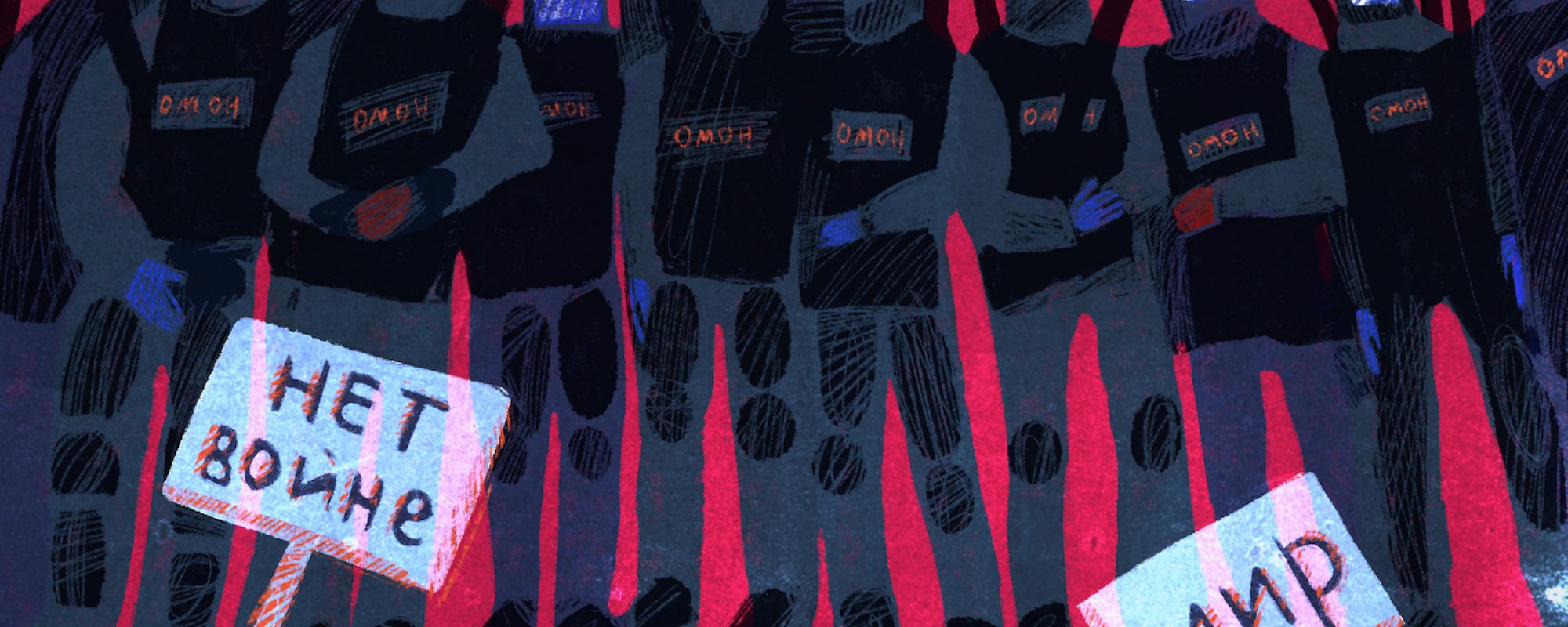In the four weeks since the publication of this report, the suppression of anti-war protests in Russia has worsened. We have supplemented the text with the latest information on propaganda and censorship, opposition to anti-war initiatives, administrative and criminal prosecutions, the application of legislation against foreign agents and the adoption of new restrictive laws. Briefly about these changes and the general picture of the suppression of anti-war protests in Russia can be read in the latest version of the report’s summary.
Date of publication: March, 14, 2022
Date of the update: April, 14, 2022
Русская версия Нет войне: как российские власти борются с антивоенными протестами
French version Non à la guerre: comment les autorités russes répriment les manifestations anti-guerre
Download PDF version
Introduction
The «Russia’s special military operation in Donbas», which began in the early morning of February 24, irrevocably changed the life of Russian civil society in just a few days. The past two weeks have led to devastating consequences.
In addition to armed hostilities on the territory of Ukraine, the special operation is accompanied by pressure on civil society in Russia. From the first day of the war, some were not sympathetic to it, and even less enthusiastic. Representatives of various communities, including journalists, lawyers, doctors, scientists, artists, writers and many others, sent dozens of open letters expressing disagreement with the actions of the Russian armed forces. Thousands of publications condemning the war appeared on social networks. Anti-war rallies took place all over Russia. In addition, the number of donations to NPOs and other associations has increased, especially to those that assist residents of Ukraine. The number of individual donations to affected citizens in Ukraine has also increased significantly.
The Russian authorities responded to these initiatives with new repressions and stricter censorship. People who signed open letters faced dismissals or expulsions from universities, as well as threats and other types of harassment for expressing their anti-war stance. Most of the independent media covering the military operations were blocked. Many media outlets have stopped working or refused to cover this topic due to the adoption of a law providing for imprisonment of up to 15 years for spreading false information about the actions of the Russian armed forces. Popular social networks such as Facebook and Twitter were also blocked by the authorities, and TikTok restricted its work in Russia due to increased legal risks.
In addition, over 17 days of anti-war protests, more than 14 thousand people were detained, including minors, lawyers, and journalists. As of March 6, at least 116 cases of non–admission of lawyers and defence counsels to police stations and at least 17 to courts were recorded. The apartments of activists, human rights defenders and journalists were searched. In general, by March 10, at least 712 people had received administrative arrests for up to 30 days, 27 people became involved in criminal cases initiated in the context of this war.
Next, we will consider the anti-war initiatives taken by civil society and measures taken by the State for suppressing these initiatives.
Propaganda and censorship
On February 21, 2022, Russia officially recognized the independence of the Donetsk and Luhansk People’s Republics, promising to ensure the «maintenance of peace» on their territories with the help of its armed forces. Later it was clarified that the republics were recognized within the borders of the Donetsk and Luhansk regions, a large territory of which was under the control of the Ukrainian authorities. In the early morning of February 24, 2022, Russian troops entered the territory of Ukraine. According to the official position of the government, on this day, Russia did not initiate war but started a «special military operation in Donbas». The goals are «protection of the population, demilitarization and denazification of Ukraine».
From the very beginning, «the special operation» was accompanied by the deployment of state propaganda at all levels and an unprecedented tightening of censorship.
Propaganda
The Russian authorities began to actively use propaganda justifying the «special military operation in Donbas».
In the first days of the war, Russian schools received recommendations for conducting lessons for students from grades 7-11 about the war on Ukraine. These lessons were supposed to convey the official point of view of the government about the reasons for the «special military operation», as well as to condemn anti-war rallies to the children. The training manual sent to teachers quotes the speech of President Vladimir Putin and emphasizes that there is not a war, but a «special military operation», which is a «forced measure» taken to «save people» and «deter nationalists who oppress the Russian-speaking population of Ukraine».
On March 3, the Ministry of Education held an All-Russian open lesson «Defenders of Peace», where schoolchildren were presented with the background of current events in the official interpretation and also explained what danger the «NATO infrastructure» poses to Russia and how to distinguish lies from the truth.
In addition, similar conversations were recommended to be held at some Russian universities. For example, on March 1, 2022, Saint Petersburg State University of Aerospace Instrumentation (SUAI) published a decree calling to take «measures to prevent crimes and other anti-social activities of students» and «to ensure that the educational work aimed at the formation of students all-Russian civil identity, patriotism, civic responsibility, a sense of pride in the history of Russia, the preservation of historical memory, respect for the memory of defenders of the Fatherland and the exploits of Heroes of the Fatherland».
The administrations of some Russian universities, including Moscow State University, have publicly expressed support for Russian military actions in Ukraine.
The student magazine DOXA reports concerning subscribers about various cases of coercion to participate in propaganda events. For example, on March 3, students of the KBSU in Nalchik were herded to a rally in support of the war and Putin, and on March 9, following the rector’s decree, students were gathered at the St. Petersburg Herzen State Pedagogical University for a mandatory «curatorial hour», where they retold Putin’s speeches and explained why the war was needed, and some groups were removed from the lessons.
There have been cases of pro-war actions and demonstrations. On March 6, a motor rally in support of the «special operation» in Ukraine was held in 12 regions of Russia. In some regions, people — mostly from a state-financed organization such as schools and hospitals — lined up in the shape of the letter «Z» for a photo. This symbol marked the military equipment involved in the «special operation». Currently, this symbol has become a universal sign of support for the Russian government and armed hostilities.
For example, a similar event was held in a children’s hospice in Kazan. During these rallies, as a rule, there are no police, participants are not detained. Moreover, they are broadcast on the mainstream news channels of Russia after. In addition, the authorities appealed to state employees with the requirements «support» the letter Z by placing it in all possible places. These calls are being actively implemented. In some cities, such symbols have filled public transport, appeared on official websites, social media accounts and buildings authorities, on the website of the regional newspaper, in dormitories. The heads of several regions have changed the official names of the subjects of the Russian Federation. For example, Kuzbass was officially renamed «KuZbass», and Transbaikalia was renamed «Zabaikalie». Similar renaming also affected departments. For example, state bodies, federal and local officials, pro-government celebrities and ordinary supporters of the authorities began to put the letter Z on avatars in social networks. T-shirts with the letter Z appeared in major Russian online stores; they were also released by the state TV channel RT.
Propaganda: UPD 14 April
In several regions, the classes on fake news were held in March, where students were urged not to believe the reports of the Ukrainian authorities about the number of dead Russian soldiers. In the same month, the lesson «Brotherhood of Slavic Peoples» was held: schoolchildren were told about the proximity of the cultures of Russia, Belarus and Ukraine, «which should remain a united nation today and not succumb to the provocations of those who are trying to divide them».
In April, the Ministry of Education sent manuals to schools instructing how to conduct lessons on the topic «Anti-Russian sanctions and their impact on the domestic economy». At the beginning of the lesson, the teacher should quote President Vladimir Putin on the point that «unprecedented external pressure is being exerted on Russia». There are also lessons on the topic of «hybrid conflicts», in which schoolchildren are invited to determine the truthfulness or falsity of various reports about what is happening in Ukraine in a form of a game. Moreover, teachers were asked to teach a lesson about the «heroes of our time» — the military, who especially distinguished themselves during the invasion of the territory of Ukraine. During this lesson, schoolchildren were encouraged to hold rallies on their social networks to support the war.
On March 4, an appeal was published by the Russian Union of Rectors, showing support for the invasion of Ukraine with the words «It is very important these days to support our country, our army, which defends our security, to support our President, who has made, perhaps, the most difficult, but necessary decision in his life». At the time of publication, the appeal was signed by about three hundred heads of higher education institutions, including such leading universities of the country as Bauman Moscow State Technical University, St. Petersburg State University, HSE, MSU and others.
On March 16, 2022, the President publicly declared the need for «self-purification of society» and that the so-called fifth column of national traitors would be «spit out on the panel like a midge that accidentally flew in». Along with this, other state bodies and officials publicly expressed their pro-military position and intolerance toward the alternative position of society.
Presidential press secretary Dmitry Peskov emphasized that citizens are prohibited from going to uncoordinated anti-war assemblies.
Deputy Chairman of the Security Council Dmitry Medvedev called criticism of the Russian authorities during the war in Ukraine «betrayal»: «You can criticize the authorities and your country, but not in a situation of war or a special operation that is being conducted».
The Chairman of the State Duma of the Russian Federation Vyacheslav Volodin stated that he wants to get the dismissal of public sector workers who do not agree with the war in Ukraine.
The Ministry of Internal Affairs of Russia openly urged not to participate in anti-war events on February 24 and March 6. On its official channel, the Ministry of Internal Affairs also published a speech from the public council on the topic «Interaction of the Russian state and society in an undeclared war».
«[00:07:37] We must, of course, somehow demonstrate this to our society… [00:08:12] This absurd monstrous spirit of hatred, we also need to pay attention. Last year, just at the end of winter, huge crowds of completely brainless, illiterate, ignorant, but imbued with that nihilism, contempt for their homeland, young people took to the streets of Moscow… [00:08:45] Therefore, today, we are quite — not quite, but simply obliged to state our words of support…».
At a meeting of the Security Council of the Russian Federation, the Chairman of the Investigative Committee drew attention to the need to «organize purposeful work to identify and suppress protest movements, respond to any provocations aimed at discrediting Russia, distorting the goals, progress and results of the special military operation conducted in Ukraine».
Media blocking
On February 24, 2022, Roskomnadzor informed the media that when preparing materials concerning the «special military operation», they are obliged to use only information and data obtained from official Russian sources. Otherwise, fines of up to 5 million rubles may be imposed on such media for the dissemination of deliberately false information based on Article 13.15 of the CAO. In addition, such materials are subject to immediate blocking following Article 15.3 of Federal Law «On Information, Information Technologies, and Information Protection», No. 149-FZ, which was amended at the end of 2021 to tighten censorship.
On February 26, 2022, Roskomnadzor sent notifications demanding to restrict access to «unreliable information» to 10 media outlets — «Echo of Moscow», «InoSMI», «MediaZona», «The New Times», «Dozhd», «Free Press», «Crimea.Realities», «Novaya Gazeta», «Journalist», «Lenizdat». Among the reasons for the restriction, Roskomnadzor pointed out that these media outlets distributed «materials in which the operation is called an attack, invasion, or declaration of war». A similar notification was sent to the online encyclopedia Wikipedia, with claims to the article «2022 Russian invasion of Ukraine».
After that, some publications began to accompany their materials with notes that, at the request of Roskomnadzor, they provided information about the war in Ukraine based on Russian official sources. For example, RBC began to do this.
The matter was not limited to notifications. Since the beginning of the «special military operation», Roskomnadzor blocked several independent media outlets covering events related to the actions of the Russian armed forces in Ukraine. Among them: radio station «Echo of Moscow», TV channels «Dozhd», «Current Time TV», «TV2», «MediaZona», «The New Times» magazine, «The Village», «Doxa», «Znak.com», «Tayga.Info», «Crimea.Realities» and others. The list is constantly updated. By March 9, only one case of unblocking had appeared. The journal «Snob», which removed all materials about the war in Ukraine from its website and refused to cover this topic, was unblocked.
Here are some examples of the rationale for blocking popular media:
- «Echo of Moscow» and «Dozhd» were blocked, as, in the opinion of the Prosecutor General, distributed information containing calls for extremism, violence against Russians, mass violations of public order and public security, as well as the participation of citizens in mass public events that violate applicable law and leading to the «violent overthrow of the constitutional order.»
- Presumably, the Tomsk TV2 agency was blocked on the same grounds.
- The website «Current Time TV» was blocked because there was «information disseminated in violation of the law», namely: «unreliable socially significant information about Russian military allegedly killed and captured on the territory of Ukraine during a special military operation conducted by the Armed Forces of the Russian Federation».
- «MediaZona» was blocked because its materials contained «deliberately false socially significant information that poses a threat of harm to the life and (or) health of citizens, a threat of mass violation of public order and (or) public safety. In particular, information materials about the alleged attack by Russia on the territory of Ukraine».
- «The New Times» website was blocked for an article about Russian soldiers killed in Ukraine.
- The online journal «Tayga.Info» was blocked for using the word «war» when covering a «special military operation» in the Donbas.
- «The Village» and «Crimea.Realities» were blocked for «publishing false information on the topic of the operation in Ukraine».
- The website of the student magazine «DOXA» was blocked because of the publication of a handbook on how to talk to relatives and colleagues who believe in Russian propaganda.
Several Ukrainian media outlets are also on the blocked list, including «The Korrespondent.net», «Ukrayinska Pravda», UNIAN, «Gordon», etc., as well as foreign media, such as BBC News Russian, Deutsche Welle, Meduza, Radio Free Europe, etc. The website «Look for Your Own», created on the initiative of the Ministry of Internal Affairs of Ukraine, was also blocked, as it was stated, for the identification of captured and dead Russian servicemen on the territory of the country.
On March 10, 2022, the European Court of Human Rights, following rule 39, decided to apply an urgent interim measure in the new case of Novaya Gazeta and Others v. Russia (complaint No. 11 884/22). The Court, in the interests of the parties and due process, taking into account the exceptional context, instructed the Russian authorities to refrain until further notice from actions and decisions aimed at completely blocking and terminating the activities of Novaya Gazeta, as well as from other actions that, in the circumstances, could deprive Novaya Gazeta of the rights guaranteed by Article 10 of the Convention (freedom of expression).
Media blocking: UPD 14 April
According to Roskomsvoboda, 1,500 sites have already undergone military censorship.
Attempts to block independent media continue. On April 10, it became known about the blocking of two online journals — «Holod» and «Discours». The reason for the blocking was a violation of the law on «discrediting the army».
Euronews TV channel was taken off the air. The next day, a state channel «Russia 24» was launched on their frequency, and starting on April 7, a new TV channel began broadcasting there. It was the channel «Solovyov.Live» by journalist Vladimir Solovyov, who was included in the EU sanctions lists for supporting Russia’s military aggression against Ukraine.
At the same time, many media outlets were included in the register twice.
In addition, Roskomnadzor demanded that the Russian media who interviewed Volodymyr Zelensky «refuse to publish this interview» and said that «a check has been launched against them to determine the degree of responsibility and take response measures».
The websites of human rights defenders were also blocked: the «Golos» Movement, the «For Human Rights» movement and Amnesty International. At the request of the Prosecutor’s Office, the VK social media blocked the pages of the members of the opposition who were against the war: Mikhail Khodorkovsky, Alexei Navalny, Ilya Yashin, the pages of Navalny’s team, Ekaterina Shulman’s fan group and others.
The corporation Meta (Facebook and Instagram) was recognized as an «extremist organization».
Along with the «Snob», the online newspaper «Novye Izvestia» was excluded from the register.
After the temporary closure of Novaya Gazeta on March 28 and the forced departure of some journalists of the publication due to pressure from the authorities, on April 7, 2020, they announced the launch of a new project — Novaya Gazeta. Europe.
Tougher responsibility for «discrediting» the army and anti-war appeals
On March 2, 2022, amendments to the Criminal Code and the CAO were introduced to the State Duma, providing for penalties for:
- public dissemination of deliberately false information about the use of the Armed Forces of the Russian Federation;
- public actions discrediting the use of the Armed Forces of the Russian Federation, including calls for unauthorised public events;
- calls for sanctions against Russia.
The public dissemination of deliberately false information about the use of the Russian armed forces as a new type of crime is now provided for in Article 207.3 of the Criminal Code. The punishment varies from a fine of 700 thousand rubles to imprisonment for three years and under aggravating circumstances up to five years. For the same acts that have entailed aggravating consequences, a penalty of up to 15 years in prison may be imposed (with deprivation of the right to hold certain positions or engage in certain activities for up to five years).
The new article 20.3.3 of the CAO establishes punishment for public actions «discrediting the use of the Armed Forces of the Russian Federation» in the form of a fine of up to 50 thousand rubles for citizens, up to 200 thousand for officials and up to 500 thousand for legal entities. In the presence of qualifying signs (among them are calls for «unauthorized» public events, as well as the creation of a threat to the life and health of citizens, public safety, etc.), the fine increases to 100 thousand rubles for citizens, up to 300 thousand for officials and up to 1 million for legal entities.
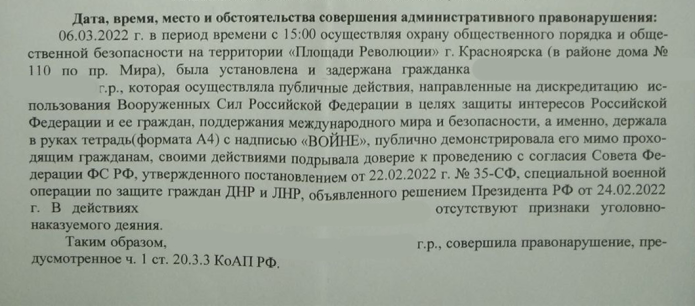
Protocol on administrative violation under Article 20.3.3 of the CAO / Provided by the detainee
If a person brought to administrative responsibility under this article repeatedly commits such an act within a year, criminal liability ensues following the new Article 280.3 of the Criminal Code. Punishment varies from a fine of 100 thousand rubles to imprisonment for up to three years (with deprivation of the right to hold certain positions or engage in certain activities for the same period). If these actions caused death by negligence and/or harm to the health of citizens, property, mass violations of public order and/or public safety, or interfered with the functioning of life support facilities, transport or social infrastructure, credit institutions, energy, industry or communications facilities, the maximum penalty increases up to a fine of 1 million rubles or imprisonment for up to five years (with deprivation of the right to hold certain positions or engage in certain activities for the same period).
According to the new article 20.3.4 of the CAO, calls for sanctions against Russia are punishable by a fine of up to 50 thousand rubles for citizens, up to 200 thousand for officials and up to 500 thousand for legal entities. In case of repeated violations within a year, a person will face criminal liability under the new Article 284.2 of the Criminal Code. The maximum penalty for this crime is imprisonment for up to three years (with or without a fine).
These amendments were made to the second reading of the draft law on criminal punishment for Russians for the execution of foreign sanctions, which has not been considered for four years. Two days after their introduction, the State Duma unanimously adopted the amendments in the second and third readings, the Federation Council approved, and the President signed them. All this happened in one day. A detailed overview of the changes can be found here.
Changes in legislation: UPD 14 April
On March 22, 2022, the State Duma immediately adopted amendments to the Criminal Code and the CAO on liability for «fake news» about the activities of government authorities abroad in the second and third readings. Amendments were made to the draft legislation on the responsibility for the destruction of forest plantations unrelated to their topic. Thus, the authorities again avoided consideration of the law in the first reading. A comparable situation has already occurred with the creation of a unified register of individuals labelled as «foreign agents» — the amendments were made to the second reading of the draft law (40 921-8) on common principles and parameters for remote electronic voting in all elections in Russia.
Under the new norms, for the dissemination of knowingly false information about the activities of Russian state bodies outside the country, liability is provided for up to 15 years in prison. For the public dissemination of such information, a fine of seven hundred thousand to 1.5 million rubles or imprisonment for up to three years will be provided. The same act committed using an official position, or by a group of persons, or «motivated by political hatred or enmity» provides for a fine of three million to five million rubles or imprisonment for a term of five to 10 years. If the spread of «fake news» about Russian state agencies caused profound consequences, the punishment will be from 10 to 15 years in prison. The law also provides for liability for «discrediting» Russian government agencies — a fine of up to three hundred thousand rubles or imprisonment for up to five years.
Amendments to the CAO — to Article 20.3.3. — imply a fine of thirty thousand to fifty thousand rubles for citizens and from three hundred thousand to five hundred thousand rubles for legal entities. Punishment is provided for cases when such actions are accompanied by «calls to hold unauthorized public events». In these cases, the amount of the fine increases: for citizens — from 50 to 100 thousand rubles, for legal entities — from five hundred thousand to one million rubles.
The amendments were signed by the President on March 25 and entered into force on April 5.
On March 23, the State Duma adopted a resolution on the establishment of a commission to investigate the facts of foreign interference in the internal affairs of Russia. On April 5, the first meeting of this commission was held, at which «11 directions of countering external interference were outlined; an appeal was prepared to the Prosecutor General’s Office of the Russian Federation to recognize 14 foreign NGOs engaged in destructive activities in Russia as undesirable» and a draft law was drawn up on the possibility of promptly giving a mirror response to countries that have banned Russian media. This draft legislation was introduced to the State Duma on April 6. It proposes to amend several laws concerning the dissemination of information and the media. The draft legislation gives the Prosecutor General’s Office the right to close the media without judicial interference and initiate a ban on the work of foreign media in Russia in response to the closure of Russian media abroad.
The agency will be able to demand Roskomnadzor recognize the registration of any media invalid if it:
- spreads «fake news» or information that «offends human dignity and public morality»;
- expresses obvious disrespect for the society, the state, the official state symbols of the Russian Federation, the Constitution, state authorities;
- disseminates information containing calls to participate in unauthorized public events or to impose sanctions;
- contains propaganda, support, or justification of extremist activity.
Journalists will also be responsible for the dissemination of such information. The draft legislation also provides the immediate withdrawal of accreditation from media journalists whose registration will be invalidated.
Moreover, it assumes the extrajudicial blocking of sites containing «false information disseminated under the guise of reliable reports» about the use of the armed forces, the activities of state bodies abroad, their discrediting or calls for sanctions. After the adoption of the new amendments, the Prosecutor General’s Office, in case of «repeated dissemination of such information», will have the right to send a request to Roskomnadzor for the immediate blocking of the site, as well as resources «like the point of confusion». According to the law, such blocking cannot be removed.
On April 4, a draft law was submitted to the State Duma providing for the introduction of criminal liability for the execution of sanctions against Russia by the heads of commercial and other organizations. The draft law proposes to supplement Article 201 of the Criminal Code of the Russian Federation «Abuse of authority». If persons who have management responsibility in a commercial or other organization use their powers to comply with foreign sanctions, their actions can be punished by a fine of up to one million rubles or imprisonment for up to 10 years with deprivation of the right to hold certain positions or engage in certain activities for up to three years.
On April 5, the draft law «On Citizenship of the Russian Federation» was adopted in the first reading, which, among other things, expands the list of crimes the commission of which entails the termination of acquired Russian citizenship. «Along with terrorist crimes, the list includes some serious crimes against the state, as well as crimes in the sphere of trafficking narcotic drugs and psychotropic substances», the draft law says. At the same time, on April 12, the chairman of the State Duma Vyacheslav Volodin expressed regret that Russians who oppose the war cannot be deprived of citizenship.
On April 6, amendments to the Code of Administrative Offences were adopted in the third reading, thus establishing responsibility for the public identification of the role of the USSR and Germany during the Second World War. According to the document, for publicly identifying «the goals, decisions and actions of the leadership of the USSR, the command and military personnel of the USSR with the goals, decisions and actions of the leadership of Nazi Germany, as well as denying the decisive role of the Soviet people in the defeat of Nazi Germany and the humanitarian mission of the USSR in the liberation of Europe» in the media or the Internet, citizens will face a fine in the amount of from 1 thousand to 2 thousand rubles or administrative arrest for up to 15 days.
New individuals labelled as «foreign agents»: UPD 14 April
On April 5, 2022, the Ministry of Justice for the first time replenished the register of individuals labelled as «foreign agents», adding journalists Yevgeny Kiselyov and Matvey Ganapolsky to it. According to the Ministry of Justice, journalists conduct political activities and receive funding from Ukraine. Before that, the register was empty, and unwanted individuals were included in the register of mass media labelled as «foreign agents».
Since 2020, a «foreign agent» can be recognized as an individual who is engaged in political activities on the territory of Russia or collects information about Russia’s military activities in the interests and with the support, including financial, of a foreign source, regardless of the person’s nationality. A foreign source means a foreign state, its state bodies, international or foreign organizations, foreign citizens, or stateless persons.
For individuals who are «foreign agents», there is a tougher responsibility for violating the obligations associated with this status, compared with other types of «foreign agents». According to Article 330.1 of the Criminal Code of the Russian Federation, a violation of the obligation to apply for inclusion in the list of individuals labelled as «foreign agents» or a requirement for reporting, committed by a person subjected to an administrative penalty for violating the reporting rules, entails criminal liability. In addition, failure to apply for inclusion in the list of foreign agents, committed by a person who purposefully collects information in the field of Russian military activities in the interests of a foreign source, is also subject to criminal liability. The maximum penalty for such violations is 5 years in prison, while for other types of «foreign agents» the maximum criminal sanction is 2 years.
Other registries were also replenished during this period. By April 14, 2022, 79 NGOs, 131 mass media outlets (82 of them are individuals recognized by the Russian authorities as foreign media agents), and seven unregistered public associations are registered in the registers of foreign agents. In addition, fifty-four foreign organizations are considered undesirable on the territory of Russia. Inclusion in the lists of foreign agents is accompanied by both formal and informal restrictions.
Media Closure Announcements
Due to numerous blockages and the threat of criminal prosecution, many media outlets have announced closure. The journal "The Village" has released a statement about the office closure in Russia. "Dozhd", Tomsk agency TV2, Znak.com, Bloomberg, CNN, BBC, ABC, CBS and CBC and others announced a temporary suspension of work in Russia.
Radio station "Echo of Moscow" has also stopped broadcasting. Yet, the decision to close the radio station was made not by the editorial board, but by the board of directors controlled by the state corporation Gazprom. Frequency "Echo of Moscow" was transmitted for broadcasting to the state channel Sputnik.
The Bell, Novaya Gazeta, It's My City, Republic, Snob, Advocate Street, Silver Rain Radio and others decided not to cover Russia's armed hostilities in Ukraine and delete (or change) existing publications on this topic.
The lists of blocked, closed and refused to cover the “special military operation” publications are constantly replenished.
Restricting access and slowing down social networks
In addition to blocking the media, the authorities began to restrict access to popular social networks. Thus, the Prosecutor General's Office has recognized that the social network Facebook was involved in violations of the fundamental rights and freedoms of Russian citizens. The corresponding decision was made following Article 3.3 of the Federal Law “On measures to influence persons involved in violations of fundamental human rights and freedoms, rights and freedoms of citizens of the Russian Federation” in connection with the "discriminatory actions" of the administration of this social network (owned by the American company Meta Platforms Inc.) to impose restrictions on the accounts of individual Russian mass media such as online publications "Gazeta.Ru", "Lenta.ru", "Zvezda" and "RIA Novosti". In this regard, Roskomnadzor first began to slow down traffic, then restricted access, and then blocked Facebook in Russia.
Roskomnadzor also blocked Twitter. The agency considered that false information about military operations in Ukraine is being distributed on the social network. In addition, Roskomnadzor demanded that TikTok exclude military content from the recommendations for minors and explain the reasons for the removal of news stories published on the official account of "RIA Novosti". Subsequently, TikTok itself restricted its work in Russia due to increased legal risks.
Roskomnadzor demanded that Google and YouTube remove "fakes" about the situation in Ukraine, distributed as contextual advertising.
Instagram Facebook's parent company, Meta, was declared an "extremist organization" by the Prosecutor General's Office on March 11, 2022, and Instagram was banned in Russia.
The Agency sent materials to the Investigative Committee to resolve the issue of criminal prosecution against the Meta guideline in connection with "the presence of signs of crimes provided for in part 2 of Article 205.2 of the Criminal Code of the Russian Federation (propaganda of terrorism) and paragraph "a" of part 2 of Article 282 of the Criminal Code of the Russian Federation (incitement of hatred or enmity with the threat of violence)".
Countering anti-war initiatives
A broad anti-war public campaign, despite the official rhetoric of the authorities, manifested itself quite noticeably from the very beginning taking various forms.
First of all, petitions, open letters and statements against the war were being launched on the Internet. A petition created by human rights defender Lev Ponomarev on the Change.Org portal has gained more than a million signatures. At the moment, there are around 100 such documents from representatives of various professions and other associations of citizens. The Economist analyzed 50,000 posts on Twitter and Instagram using the hashtag #nowar, determined the geolocation of 7,000 of them and found publications in 83 Russian regions and 50 cities all over the country – the geography and scale of support are unprecedented.
After the publication and dissemination of such statements, reports began to arrive concerning visits by law enforcement officers to the people and organizations that signed the petitions.
There are also some cases of dismissals. Managers and employees of state-funded or government-affiliated structures — theatres, museums, or large companies – resign due to moral considerations and disagreement with the policies of organizations. There are examples of forced dismissals and pressure on employees of various institutions who spoke out against the war. This is especially common in the culture sector. For example, an actor of the Moscow Academic Theatre of Vladimir Mayakovsky published "information from the Department of Culture", presumably distributed among employees, that any negative comments on the "course of the special military operation in Ukraine" would be regarded as treason to the Motherland. Director of the "Polet" and "Zvezda" cinemas Ekaterina Dolinina was asked to resign the day after signing an open letter against the war. Artistic Director of the Meyerhold Center Dmitry Volkostrelov was fired after publishing an anti-war post on the Center's Instagram. The Friday and TNT TV channels closed the shows and cut ties with producers who spoke out against the war. Russian comedians Denis Chuzhoy, Mikhail Shats and Danila Poperechniy, who signed an open letter against the war, told about threatening phone calls. On March 3, Lev Ponomarev was attacked by unidentified individuals - employees of the NTV TV channel were also present during the attack.
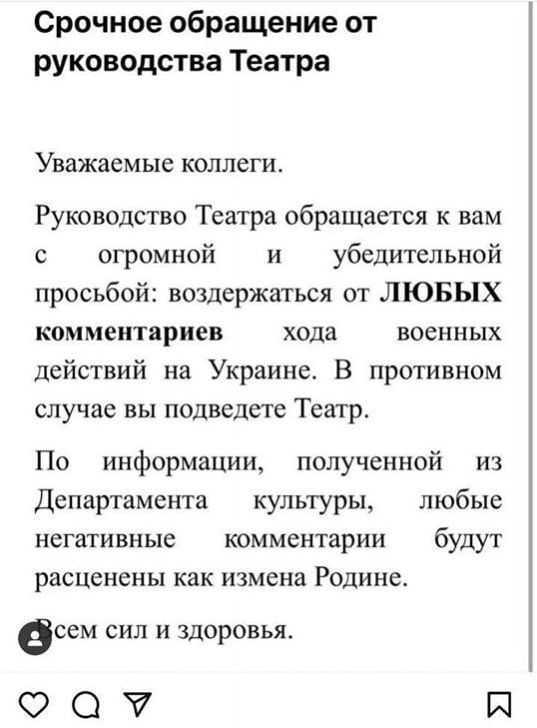
The appeal of the theatre management / Screenshot of the post from the social network
Ksenia Suvorova, the compiler and initiator of the open anti-war letter of medical workers, which gained more than 17 thousand signatures in a week, told about the threats. The collection of signatures was suspended due to the entry into force of the amendments on "fake news". Moreover, the St. Petersburg State Pediatric Medical University examined the personal files of employees who signed letters that were allegedly "aimed at radicalizing society and extremist manifestations". Some of the employees decided not to continue working in Russian state institutions.
This is far from the only university whose employees or students are being pressured. According to DOXA, as of March 10, at least 30 higher educational institutions had conversations about the inadmissibility of participating in rallies and publicly expressing a position other than the official one, and criminal liability for it. Students of the Higher School of Economics report that the guards make "some lists" of students who came wearing anti-war masks. One of the employees of the RUDN University reported to OVD-Info that on the morning of February 26, the police were looking for anti-war protests participants in the university dormitories. The Dean of the MGIMO Faculty of Management and Politics, Henry Sardaryan, launched a project "to help and support Donbas", students who did not want to participate in the project were asked to leave the faculty chat. "Takie Dela" report that Russian universities warn students from speaking out against the war. For example, students of the Moscow State University of Food Production were threatened with administrative penalties or expulsion for posts on social networks criticizing the actions of the Russian state. Representatives of the university noted that they can be expelled both for materials in social networks and for an active discussion of events in Ukraine. A similar situation is observed in the Russian State University named after S. A. Yesenin. At the Financial University under the Government of the Russian Federation, the group leaders were asked to "monitor" the statements of both students and employees, and those who lived in a dormitory were threatened with eviction for hanging posters. Students of the Faculty of Bioengineering and Bioinformatics and the Faculty of Biology of Moscow State University reported the arrival of security officers who threatened to expel students who go to the rallies.
But the pressure is not only limited to words. St. Petersburg State Pediatric Medical University has already expelled two students - Ilya Bochkarev and Victoria Pershenkova. Earlier, they were detained because of anti-war rallies and were imposed on administrative charges. Information about this appeared on the university's website. In the message, the university notes that the decision to expel was made according to violation of the universities charter, as well as due to "incompatible with the high rank of a doctor and a student of a medical university behaviour".
On March 9, it also became known that St. Petersburg State University had prepared the expulsion orders of 13 students who were detained at anti-war rallies. Veronika Samusik, who covered the rallies as a journalist of the Sota.Vision network, was also detained thus ended up on the list. The list may be replenished, as several more large rallies have taken place since the order was issued.
There have been cases of pressure on teachers and students of Russian schools in connection to the above-mentioned special social studies lessons on the topic of war. According to "Kholod", a teacher from Ivanovo, Alexey Vtorov, who refused to show Putin's speech to the students, is facing dismissal. In Moscow, on March 7, police officers came to a twelve-year-old schoolboy who expressed his position on the war against Ukraine, turned off the electricity and left a summons "to call for interrogation" with threats to subject him to a drive.
Journalists covering the events related to the "special military operation" were also subjected to pressure. On February 24, 2022, the journalist of "IStories" Irina Dolina and the cameraman with whom she was filming a report about residents of the Rostov region and refugees from the LDPR were rudely detained in the city of Shakhty. As a pretext for the detention, the security forces called an "anti-terrorist operation". The journalists were forced to leave the city under the threat of prolonged detention. A few days later, "IStories" was added to the list of undesirable organizations.
Kommersant journalist Elena Chernenko was excluded from the pool of journalists of the Russian Foreign Ministry for "unprofessionalism" after she wrote an open letter condemning this "operation".
In the Sverdlovsk region, the police seized the circulation of several newspapers of the “VK-Media" publishing group – "Evening Krasnoturinsk", "Globe" (Serov), "Evening Karpinsk" and "ProSeverouralsk.RU” - with headlines condemning the "special military operation" in Donbas. QR codes with a link to the petition on Change.org against the war were also placed on the covers of newspapers. In Moscow, the police came to the studio of Partisan Press, which printed anti-war posters, and detained the employees who were there.
On March 1, NGOs and charitable foundations that signed an open letter to the president against armed hostilities on the territory of Ukraine reported that they were disconnected from the charity program on the website of the Moscow mayor mos.ru. Later, Olga Zanko, the chairman of the central council of supporters of United Russia, the deputy chairman of the State Duma Committee for the Development of Civil Society, proposed to deprive NGOs that oppose the interests of Russia of state support.
On February 27, 2022, the Prosecutor General's Office, in the context of a “special military operation”, issued a statement mentioning that "the provision of financial, logistical, consulting or other assistance to a foreign state, international or foreign organization or their representatives in activities directed against the security of the Russian Federation contains elements of a crime under article 275 of the Criminal Code of the Russian Federation (high treason)”. The commission of such a crime is punishable by imprisonment for up to 20 years.
Sberbank has already started blocking the cards of Russians who donated money to Ukrainian funds. In support of the blocking, the bank referred to the fulfilment of the requirements of the Federal Law "On Countering the Legalization (Laundering) of Proceeds from Crime and the Financing of Terrorism."
The FSS urged to report contacts with possible Ukrainian spies — under the threat of criminal liability.
A special attitude was also shown to the citizens of Ukraine. Ukrainian citizens detained at anti-war rallies since February 24 are being questioned separately by security forces. Two citizens of Ukraine, permanently residing and working in Moscow, applied for legal assistance because of the district police officer's visit. He asked questions about their purposes of staying in Russia, collected their data, photographed the documents, motivated the procedure with the "war with Ukraine", warned against "information on the Internet" and suggested not to interfere "in things like sabotage and terrorism".
On February 27, it became known that more than 10 Ukrainians living in Russia were detained, allegedly for violating migration legislation.
There have been cases when representatives of civil society who do not support various actions of the authorities were put under pressure indirectly related to what is happening in Ukraine. So, on March 4, people from incomprehensible law enforcement agencies, without identification marks, came to the offices of the International Memorial and the Memorial Human Rights Center with a search, neither informing the purpose of the search nor providing a warrant or other certifying documents. No one was allowed into the offices, including lawyers, the windows were covered with cardboard from the inside. Simultaneously with the searches in the Memorials, the FSS searched in the office of the Civic Assistance Committee, which is headed by a member of the Memorial Human Rights Center Management Board, Svetlana Gannushkina. Searches in the "Memorials" lasted more than 14 hours. Law enforcement agencies seized a lot of things and boxes with documents, without telling which ones they took, and tried to crack the safes. In addition, sheets of paper and a flipchart located in one of the offices turned out to be covered with the letters Z and V, which marked military equipment participating in a ”special operation" on the territory of Ukraine. Some media reports said that the searches may be related to the criminal prosecution of a member of the Memorial Human Rights Center and the head of the human rights organization "Help" Bahrom Khamroev, who is accused of public justification of terrorism. The same information was reported by some of the employees who arrived for the searches, but there is no official confirmation of this.
The letter Z was also found on the door of his apartment by film critic Anton Dolin, who announced his departure from Russia on March 6, as well as a theatre critic Marina Davydova.
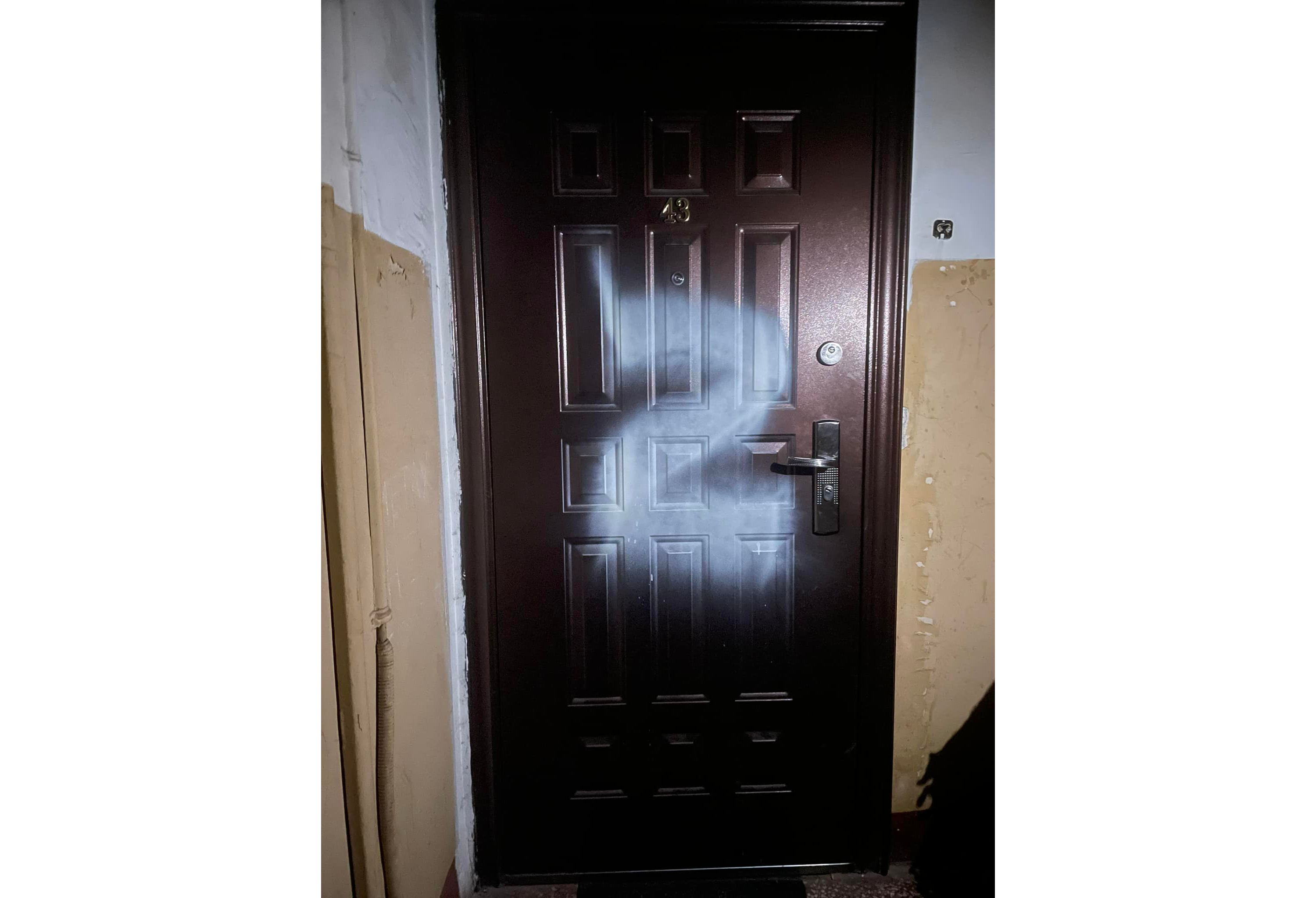
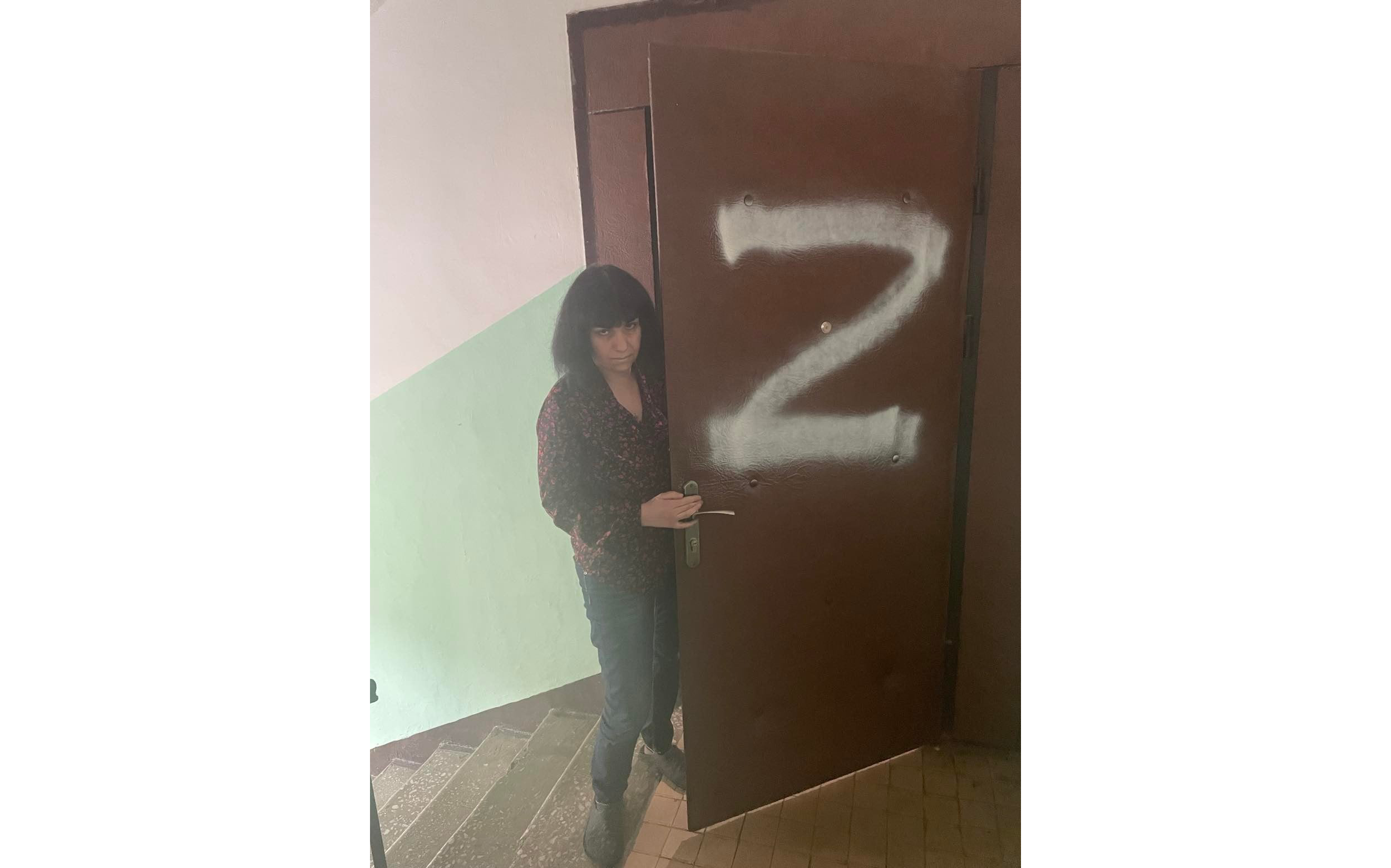
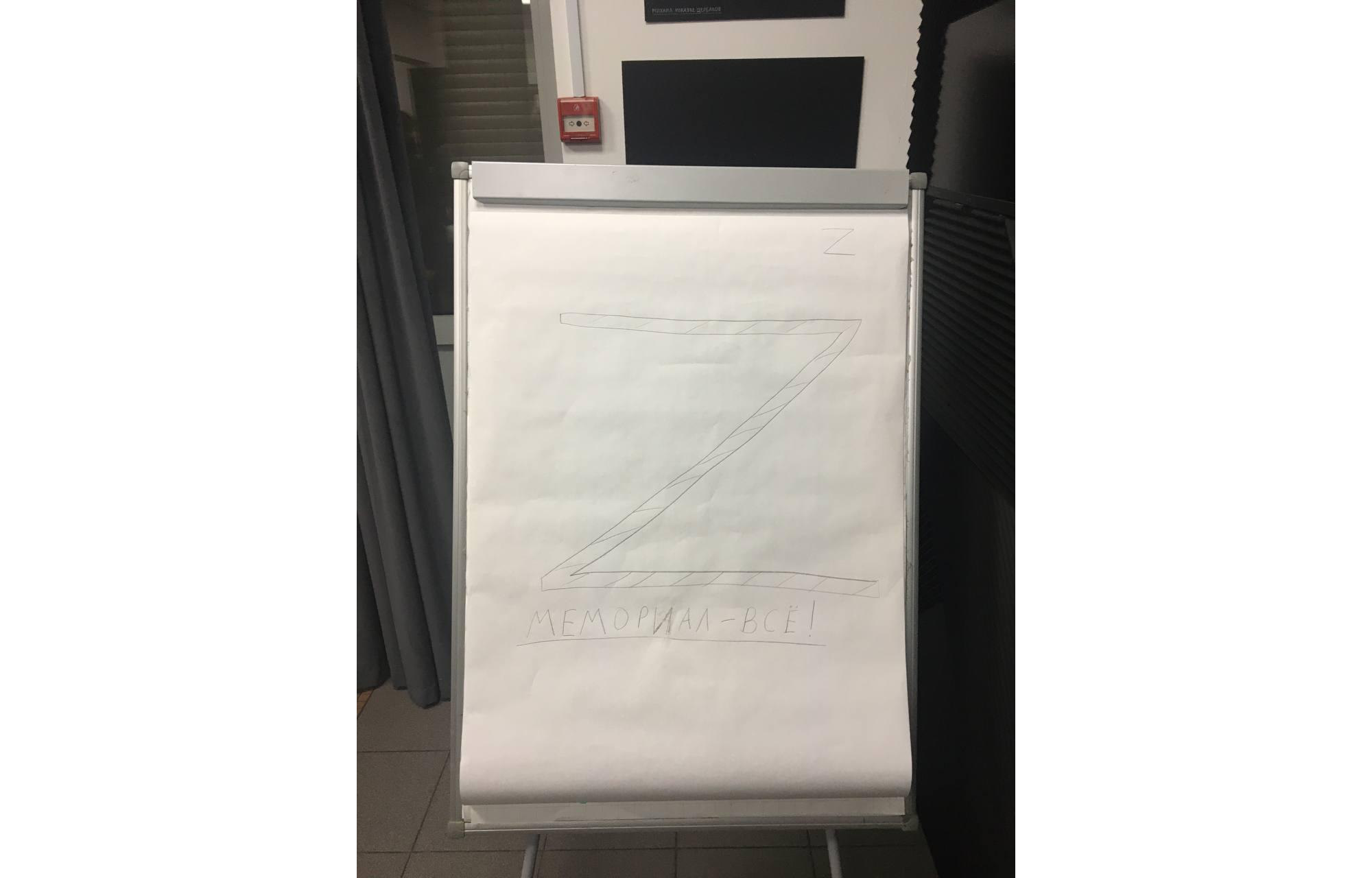
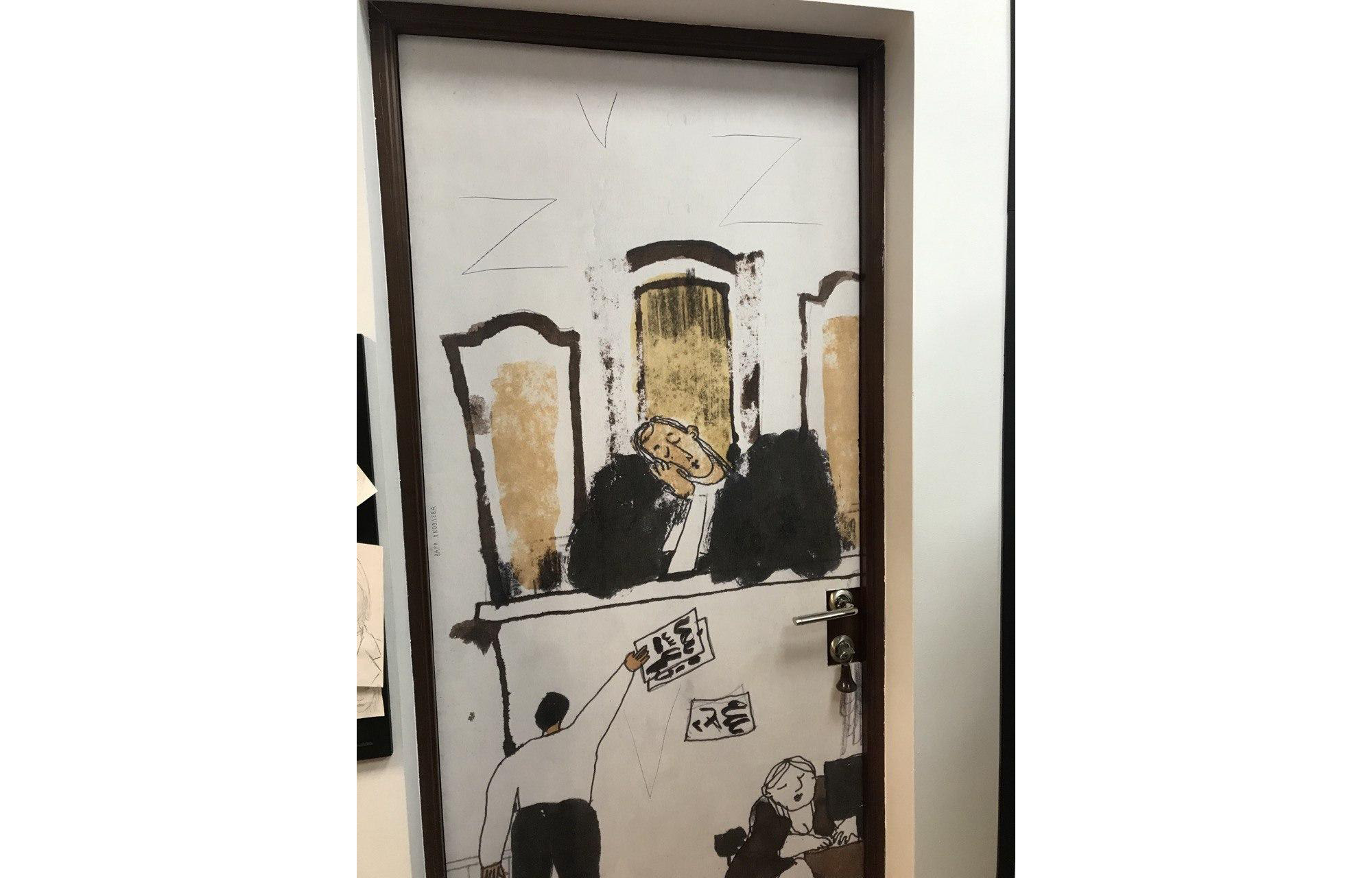
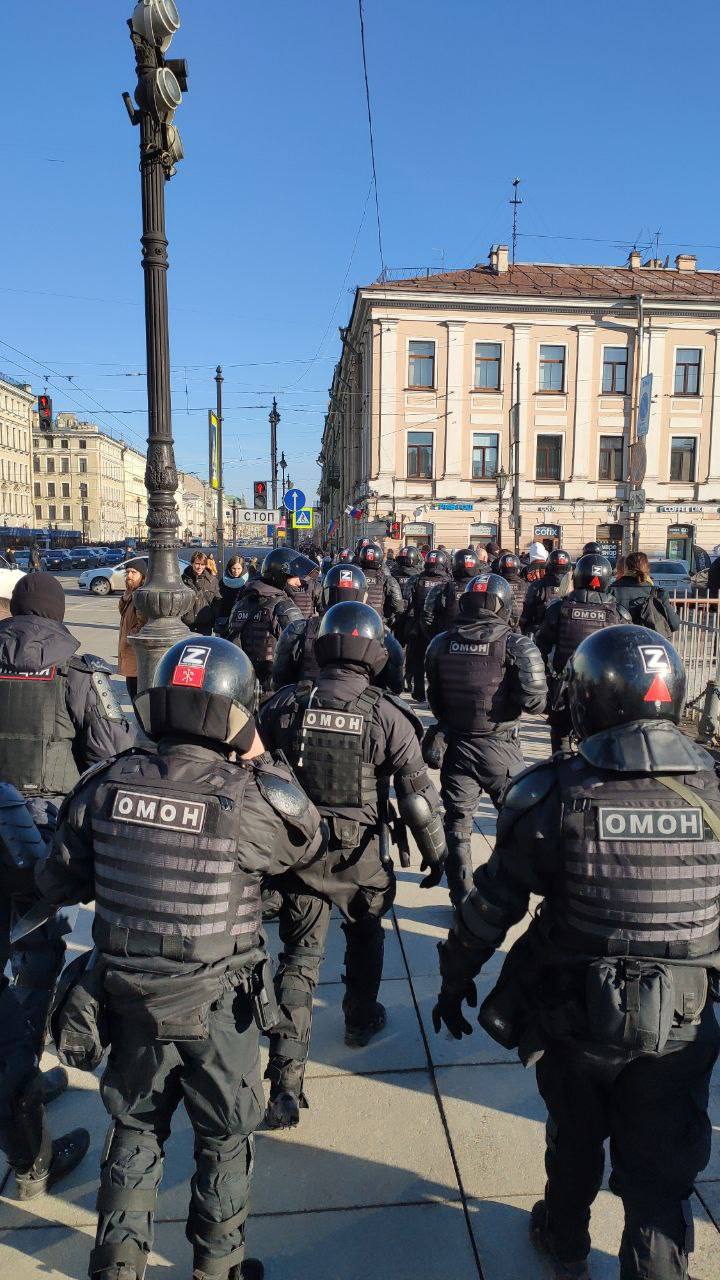
Countering anti-war initiatives: UPD 14 April
Novaya Gazeta reported that residents of the city of Kaliningrad began to receive SMS messages from the city authorities with an appeal to send the data of «provocateurs» for verification in connection with the «special operation» in Ukraine. The message was signed by the regional government. The link from the SMS leads to a Telegram bot with the letter Z on the avatar in the colours of the ribbon of Saint George, which «fights provocateurs and scammers».
Users are asked to inform the bot of «phone numbers, as well as e-mail addresses of Internet resources used to carry out illegal actions».
In Moscow, unknown people continue to ruin the doors of those who disagree with the «special operation». The home of Oleg Orlov, an employee of Memorial, and Dmitry Ivanov, the administrator of the «Protest MSU» Telegram channel, were ruined with «patriotic» inscriptions. This is the second attack on Dmitry Ivanov’s apartment. A similar thing happened with the door of the Moscow municipal deputy Lucy Stein. In St. Petersburg, on March 25 and 26, vandals damaged the door to the apartment of activist Daria Heikinen. In addition to the leaflets with the inscriptions «A Finnish Nazi lives here», «We will not forgive Nazism», unknown people ruined the locks with construction foam, poured brilliant green paint all over the door and left manure in front of it.
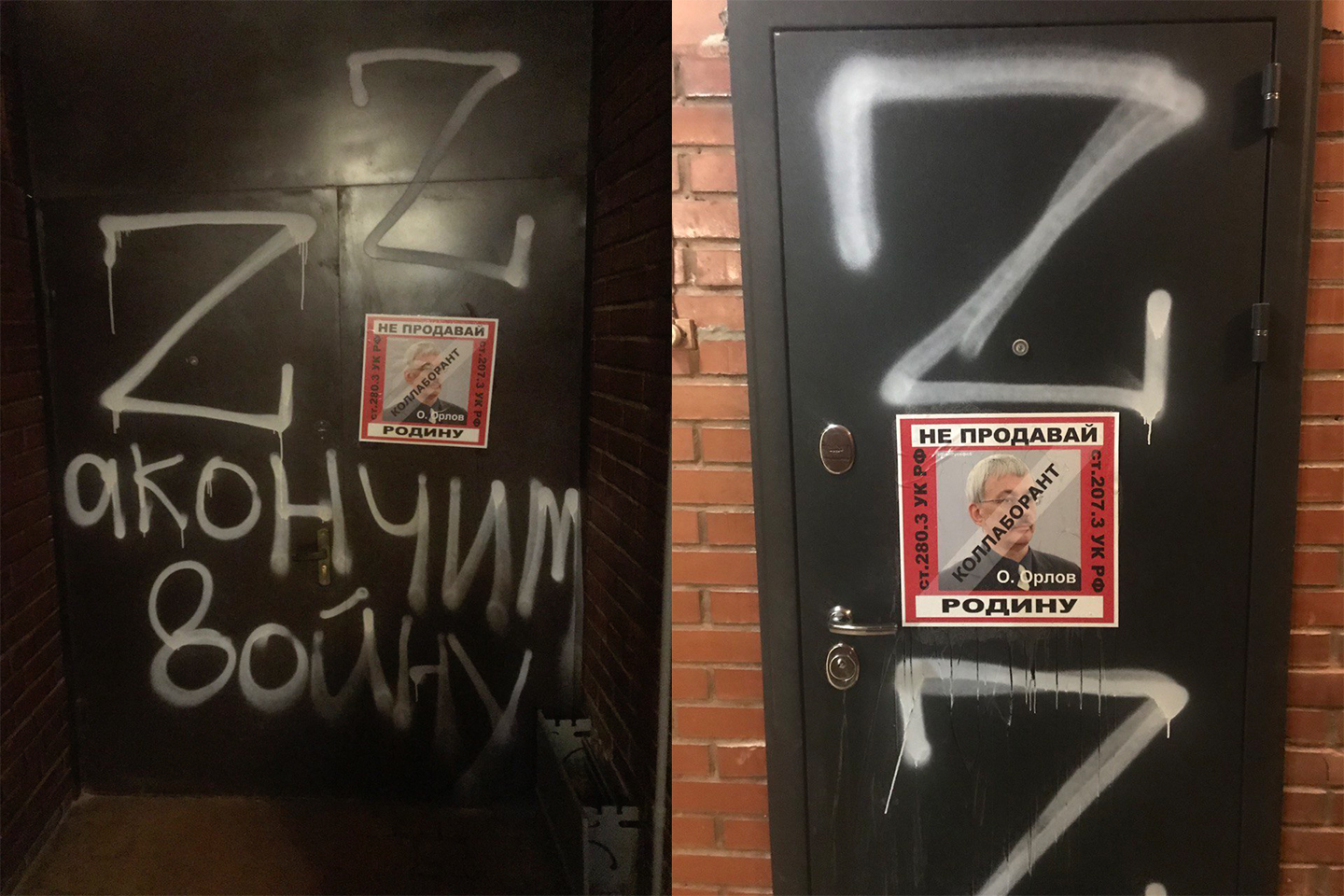
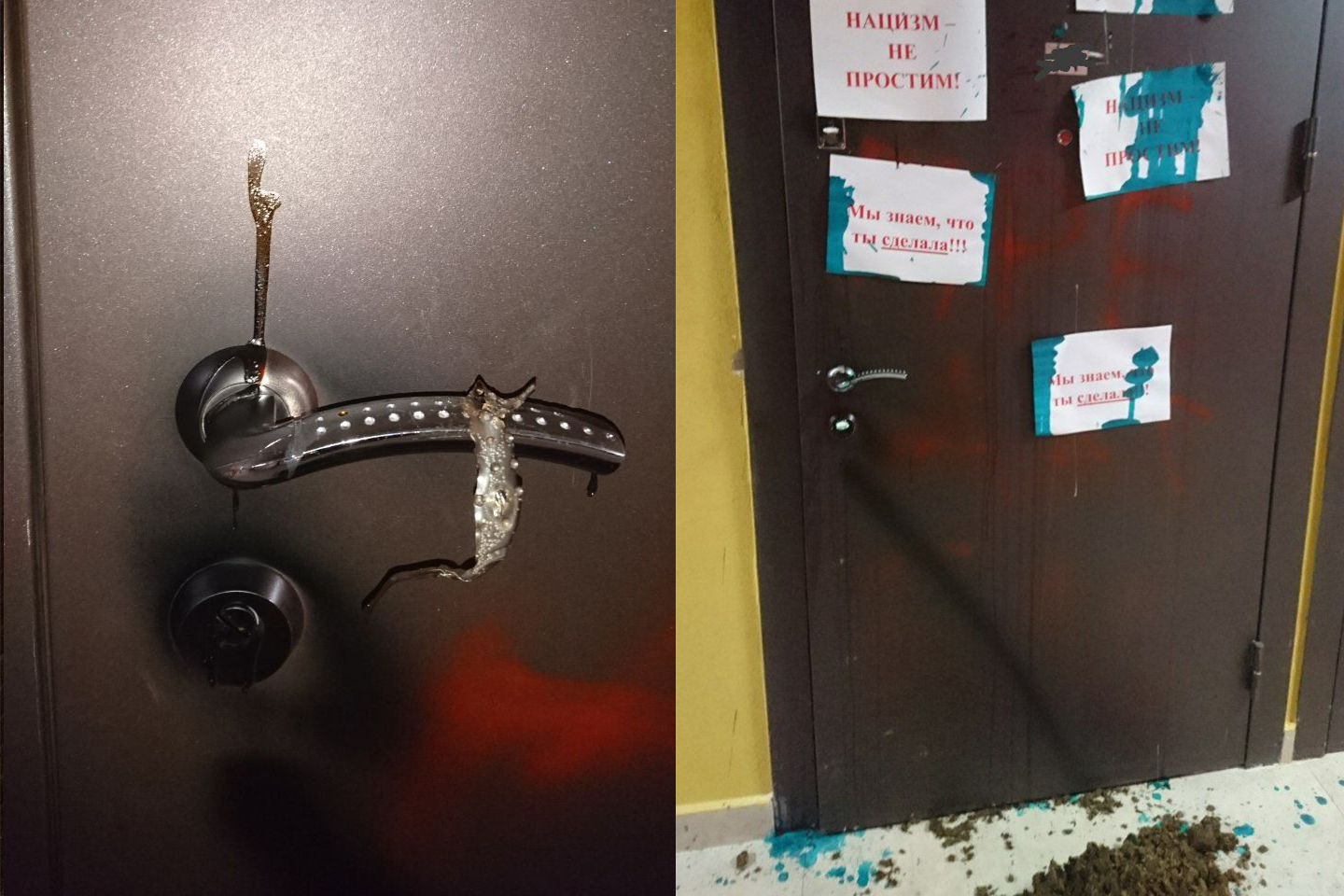
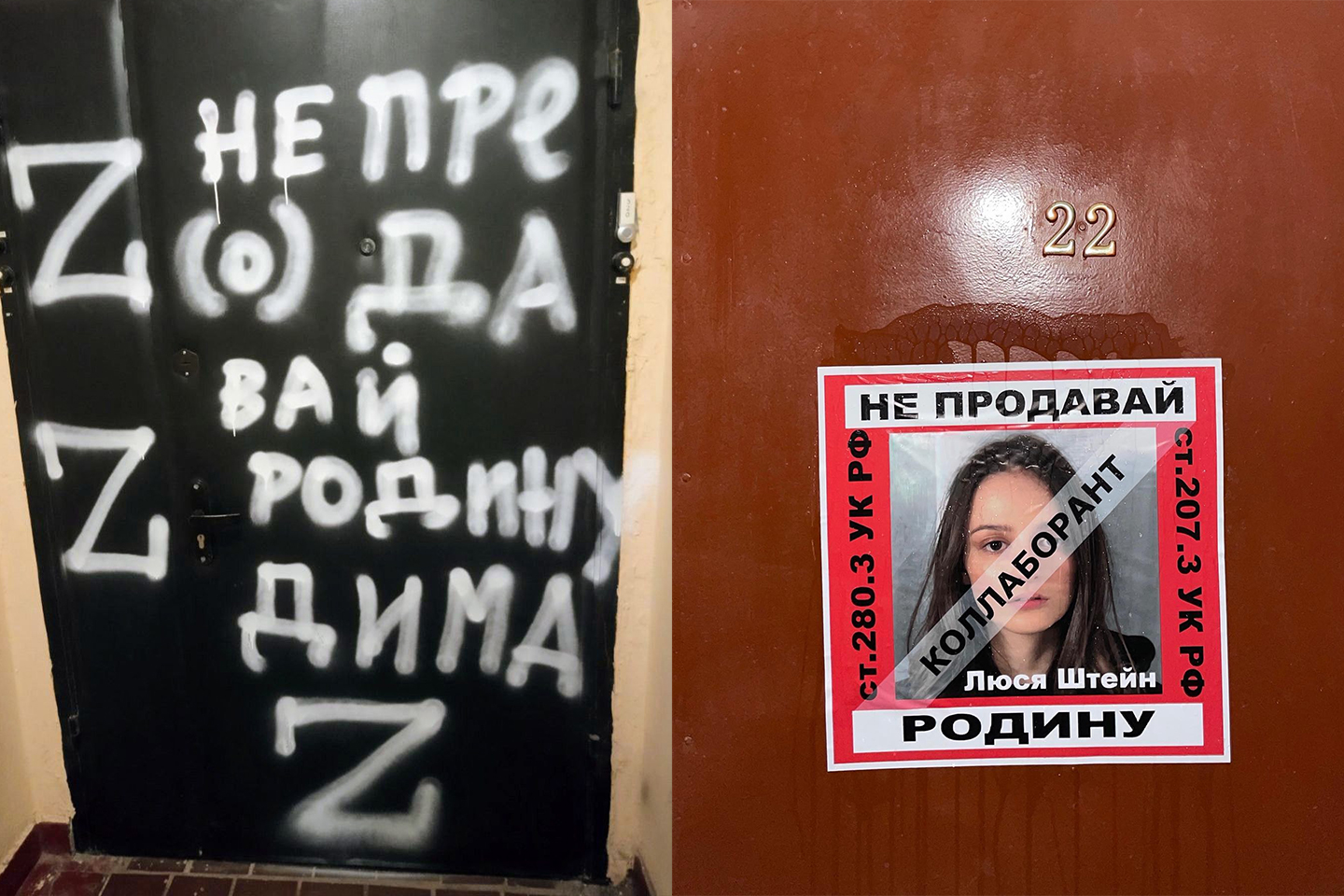
On the day of the news about the launch of «Novaya Gazeta. Europe», Nobel laureate and editor-in-chief of Novaya Gazeta Dmitry Muratov was attacked. Muratov was travelling on the Moscow-Samara train when someone poured red oil paint with acetone on him, shouting «Muratov, this is for our boys». Later, responsibility for the attack was taken by the authors of the Telegram channel «Union Z Paratroopers». Novaya Gazeta established the identity of the attacker: he was most likely a member of the union Nikolay Trifonov. Despite this, the suspect has not yet been detained, a criminal case has not been initiated.
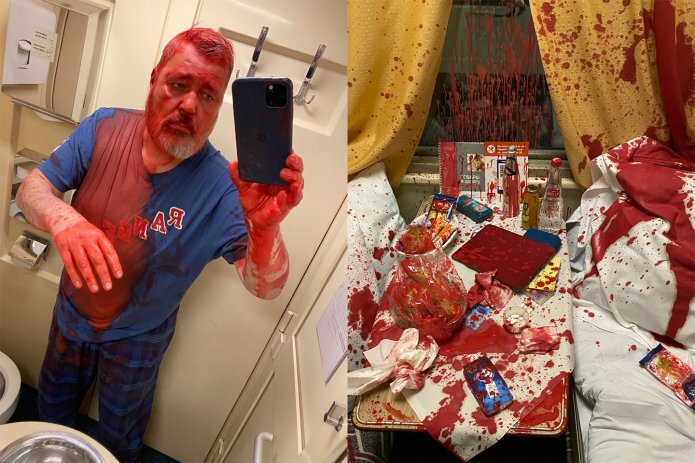
Dmitry Muratov and his seat on the train after the attack / Photo: Novaya Gazeta
After the news about the expulsion of students for participating in uncoordinated rallies, information about major violations in the expulsion procedure itself also appeared. Novaya Gazeta reported that two students at the Plekhanov Russian University of Economics Polina Lysenko and Antonina Begacheva found out about their expulsion on March 15, when they could not log into their Microsoft university accounts. The expulsion order itself was issued on February 28, and posts on social networks against the war were published on February 24. The students reported that they should have been warned about their expulsion 14 days in advance. Employees of the university administration, when asked to provide a notice of expulsion (which should accompany the order) and certificates of completion of education, only sent students from office to office. Now, an appeal for clarification has been sent to the Vice-Rector of the Plekhanov Russian University of Economics, the response must be provided within 30 days. Antonina Begacheva and Polina Lysenko said that this decision was made due to the publication of several Instagram stories about the beginning of a «special operation» in Ukraine.
The pressure that is indirectly related to what is happening in Ukraine : UPD 14 April
In addition, there were cases of advocates being detained, and the searches in their apartments were conducted. Olga Mikhailova and Vadim Kobzev, Alexey Navalny’s lawyers, were detained near the Pokrovskaya colony on March 22, immediately after the announcement of a new sentence to Alexey. They were later released without being charged. The search of the lawyer’s apartment Mikhail Benyash was held in his absence on March 12. On March 31, a lawyer Sergey Kostyuk and the defender Irina Shipulina both cooperating with OVD-Info were also detained and then released.
Also, on February 28, the decision to liquidate the International Memorial came into force, and on April 5, the decision to liquidate the Memorial Human Rights Center, despite the decision of the ECHR under Rule 39 to suspend the liquidation processes. Contrary to the Law on Non-Profit Organizations, which unambiguously describes the procedure for liquidation of an organization, at the request of the Ministry of Justice of the Russian Federation in the Unified State Register of Legal Entities, a record has already been made about the allegedly completed procedure for the liquidation of the International Memorial. As a result, the accounts of the International Memorial were blocked, and it is impossible to cover obligations to employees and external organizations.
On April 8, the Ministry of Justice closed the representative offices of Amnesty International, Human Rights Watch, the Carnegie Endowment for International Peace and twelve other foreign and international organizations in Russia. The Agency excluded them from the register of branches and representative offices of international organizations and foreign non-profit non-governmental organizations due to «violations of the law», without specifying what those «violations» were.
Suppression of anti-war rallies
The invasion of the Russian military into the territory of Ukraine on February 24 was sudden, although, before that, some Western media reported on the possibility of such an invasion. The outbreak of the war caused a heated public discussion, as a result of which people in different cities spontaneously began to take to the streets with solo demonstrations, small and mass assemblies. The rallies that began on Thursday, February 24, continue to this day.
Russian legislation contrary to international standards does not provide for a special legal regime for spontaneous assemblies. In practice, the unauthorised nature of even a peaceful rally allows the authorities to declare it illegal and call the participants offenders. Over the past days of anti-war protests in different cities, attempts have been made to authorise public events. But they were not successful.
The end of the first week of anti-war protests also marked the anniversary of the murder of Russian opposition politician Boris Nemtsov. On this day, February 27, memorial rallies are usually held in different cities of Russia. This year, in some cities, these events have also acquired an anti-war nature. The organizers failed to authorise the rallies with the authorities.
- So, in Moscow, a traditional mass laying of flowers was planned at the murder scene of Boris Nemtsov. Initially, this event was agreed upon, and the mayor’s office did not object to its holding. However, after the start of the war in Ukraine, the mayor’s office radically changed its decision by sending a letter informing about the «cancellation of the event».
- In Perm, the organizers wanted to hold a rally in memory of Nemtsov but to combine it with an anti-war rally. The city authorities refused to approve the event, citing the lack of consent of the governor’s administration. Earlier, the governor’s administration refused to approve the rally due to the «complication of the sanitary and epidemiological situation». The organizers tried to challenge the refusal in court but to no avail.
At the same time, a large number of police officers and paddy wagons on the streets of Russian cities indicates that the authorities are ready for assemblies and are initially determined to stop them, as well as ready for mass detentions of participants.
Sanitary restrictions
By the beginning of the anti-war protests in several Russian cities, including Moscow and St. Petersburg, due to the pandemic, any public assemblies, including even solo demonstrations, were banned for the second year. Such bans coexisted with nightclubs, restaurants, public transport, sports events, religious assemblies, and others that were open to the public. Practically, only protest forms of expression and assembly were banned. Such restrictions have become a convenient reason to ban anti-war rallies and to hold some protesters accountable for violating sanitary restrictions.
Amid public discussion around the war campaign and economic sanctions, the authorities began to lift quarantine restrictions, in particular, to cancel QR codes for visiting public places and events. At the same time, the ban on holding public events, including solo demonstrations, remains in force, and the authorities continue to refuse to approve the rallies.
- For example, the Sverdlovsk Region’s Ministry of Public Security refused libertarians to hold an anti-war rally in Yekaterinburg. Activists wanted to gather about a thousand people, but the ministry considered that such a massive public event contradicts sanitary and epidemiological requirements.
- For the same reason, the Moscow authorities refused to approve the application of the Yabloko party to hold an anti-war march on March 12.
- In St. Petersburg, the administration of the Kalininsky district refused to hold an anti-war rally, citing an anti-covert government decree that is valid until March 31.
- It should be noted that the organizers of events in support of the «special operation» also face refusals to approve on the same grounds. So, on March 7, the leader of the St. Petersburg branch of «The Other Russia of E. V. Limonov» Andrey Dmitriev announced to the people gathered at the rally that it was not agreed «because of COVID». In addition, municipal services started snow removal on Lenin Square, where the rally was planned.
During the «special military operation», in some regions (for example, Tatarstan, Tomsk Oblast), the previously cancelled coronavirus restrictions on holding public events were re-adopted.
Peaceful nature of the rallies
In general, anti-war rallies are peaceful. People gather in the central squares of cities, some with posters with calls for peace or expressions of support for the people of Ukraine. Many do not have any campaign materials and just come without anything or with small badges on their clothes or bags.
The materials of the administrative cases against the detainees do not say that the protesters organize mass riots or otherwise violate public order. As a rule, people are accused of shouting anti-war slogans calling for peace: «No war», «I will never forgive you this war», «Putin, hands off Ukraine», «No war with Ukraine», «We don’t need such a Russia! Ukraine, don’t give up», etc. At the same time, such slogans do not contain insults and do not contradict the standards of freedom of expression. Despite this, the authorities continue to claim that these rallies are illegal, their participants attract the attention of the press and passers-by, shouting aggressive slogans, and also hinder the functioning of the city infrastructure. Below are some typical quotes from the materials of the cases against the protesters:
- «As part of a group of citizens… attracting the attention of citizens and the media, ignoring the explanations of police officers that this event was not authorised by the Moscow government, and the demands to stop illegal actions, consciously continued to take part in an unauthorised public event; continued to chant the slogans «No war», «I will never forgive you this war», «Putin, hands off Ukraine» and others, that is, voluntarily took part in an unauthorised public event in a combination of forms of rallying and picketing».
- «Violated the procedure for holding a public event in the form of a rally, which turned into a procession, namely, being in a group of citizens of more than 2700 people; being aware of the lack of authorisation for holding this public event, took part in an unauthorised… public event… and shouted slogans «No war!». She did not react… to the repeated demands of a police officer, continuing to take part in an unauthorised rally that turned into a march»
- »… a public mass event took place in a combination of forms of rallying and picketing not authorised with the executive authorities of the city of Moscow with more than 700 participants, during which the participants of the event held posters with the inscriptions: «No war!», «No war with Ukraine», «We don’t need such a Russia! Ukraine, don’t give up,» etc., while shouting slogans: «No war!», thereby attracting the attention of the media, bloggers and an indefinite circle of citizens to this rally. One of the participants of this public event was a citizen…»
At the same time, some detainees claim that they did not shout any slogans.
The materials of cases involving administrative offences also include charges of violating the functioning of urban infrastructure and interfering with the movement of transport and pedestrians:
- Violated the procedure for holding a public event in the form of a rally that turned into a march, namely, being in a group of citizens of more than 2700 people; being aware of the lack of authorisation for holding this public event, took part in an unauthorised… public event… by interfering with the functioning of transport infrastructure (bus stop). She did not react… to the repeated demands of a police officer, continuing to take part in an unauthorised rally that turned into a march»
The exercise of the right to freedom of assembly is one of the legitimate forms of using urban space. Following international standards, the authorities are obliged to show tolerance to assemblies and help citizens to exercise their rights, for example, by reorganizing transport and walking routes. Regarding anti-war and other protests, the authorities do not fulfil these obligations. On the contrary, protesters face mass detentions. The abundance of police officers and paddy wagons in the city centres itself creates significantly greater inconveniences for urban infrastructure than peaceful protests.
- According to eyewitnesses in Novosibirsk, on March 2, at around 15:00, the exit from the Lenin Square metro station in the direction of the Museum of local lore was closed. Lenin Square itself was cordoned off by representatives of law enforcement agencies, paddy wagons were seen in the area of the monument.
- In Moscow, on March 6, riot police completely blocked the exits from Manezhnaya Square, the sidewalk was blocked at Pashkov’s house, no one was allowed in the direction of the Kremlin.
Law enforcement agencies report cases of aggression and violence by protesters. Moscow, St. Petersburg and Yekaterinburg have already initiated several criminal cases of violence against a representative of the authorities (article 318 of the Criminal Code). Criminal cases related to anti-war speeches are analyzed in more detail in the relevant section of this report. The cases presented require careful study and proceedings. At the same time, it is important to note that they have rather isolated than mass manner. That is, they cannot be used to represent the entire protest as not peaceful.
Detentions
According to OVD-Info, from February 24 to March 13, at least 14,906 people were detained at anti-war rallies in 155 cities of Russia. Official information about the number of detainees across Russia has not been reported, and some available data of the Moscow police were noticeably underreported in comparison with the OVD-info evaluation: thus, the Ministry of Interior claimed detention of 600 people on 24 February, the first protests in Moscow (according to OVD-info — no less than 1080) and of the detention of 3,500 people across Russia on March 6 (according to OVD-Info data, more than five thousand arrests took place that day).
People with children, animals and means of transportation were detained. Mass protest rallies and spontaneous walks with a large number of participants were not the only for detentions, but also solo demonstrations and various forms of protest against the war: the use of anti-war symbols, the colours of the Ukrainian flag, laying flowers at the Embassy of Ukraine or the Tomb of the Unknown Soldier.
- On the day of the invasion of Russian troops into the territory of Ukraine from 11 a.m., news began to arrive about the first detentions at solo demonstrations in Moscow, Novosibirsk, Omsk, Yekaterinburg, Irkutsk and Saratov. Activists had posters "Omsk is against the war. Stop", "No war, don't be silent", "Putin is a war criminal".
- On March 3, artist Katrin Nenasheva was detained in Moscow during a "Peaceful dinner" in an "Open Space". "They impute Article 19.3, "disobedience to the police", although I immediately gave them my passport and went into the car. Let me remind you that I wasn't even standing at the picket and wasn't participating in the anti-war rally today. I just organized a "Peaceful dinner" where people could get support and talk about how to cope with stress", — said Nenasheva. The court arrested her for 14 days.
- On March 6, in Irkutsk, the police detained a man with his mouth taped shut and holding a blank sheet of paper, as well as a courier from Yandex.Lavka, who was wearing a yellow jacket and a blue backpack, the newspaper "Sibir.Realities" reports”. The courier was taken to the police department, while the bike was left on the sidewalk.
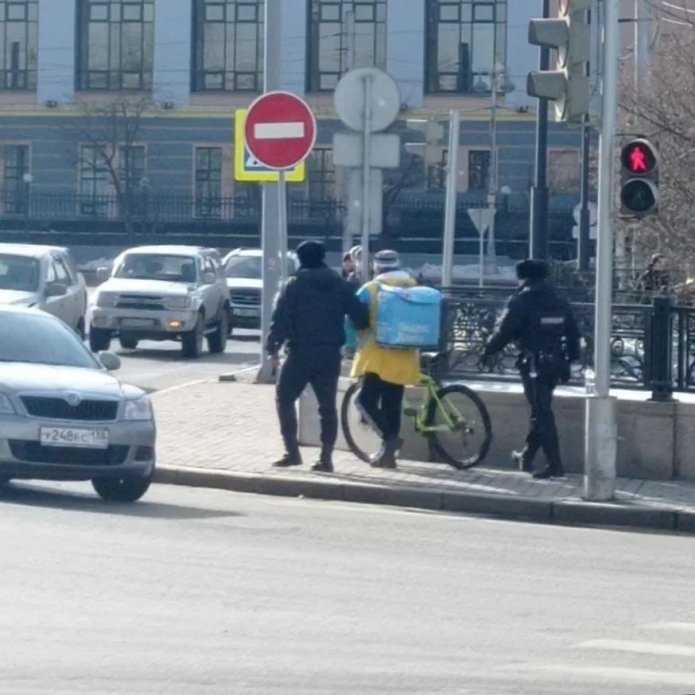
Detained for a colour scheme / Photo @baikal.people
- There are cases when cars with anti-war symbols attracted the attention of the police: drivers were detained, and sometimes forcibly pulled out of the car. In Chelyabinsk, a car with a Pacifica in the colours of the Ukrainian flag was sent to the impound lot.
- There are at least 20 cases of detentions of protesters after the rallies. At the same time, there are cases of several detentions on the same day – a person was detained in Omsk returning home from a single picket – and detentions in the days following the rallies. We also know about a girl who was released from the Timiryazevsky police department with an explanatory note after a solo demonstration, but the next day she was taken off the plane to Sochi and driven to the same department to draw up a protocol under Part 5 of Article 20.2 of the CAO (violation of the procedure for holding a public event by a participant). One girl was stopped by a policeman near the subway, handed flowers and asked to take a photo. Sometime later, at the entrance of the same subway, the girl was detained by police. Such detentions also occur because of the facial recognition system, when after participating in the rally, cameras at the entrance or in the subway can identify a person.
- At the March 6 rally, the police also forced passers-by to show the contents of their mobile phones, not letting them through in case of refusal. If there were any photos or messages related to anti-war protests, the person was arrested. The same thing happened on March 8 at two stations of the Moscow metro.
At least in three cities — Moscow, St. Petersburg, Yekaterinburg and Novosibirsk — there were cases when protesters were detained by people not wearing a uniform or without the necessary identification marks of law enforcement agencies.
At the Gostiny Dvor metro station, where anti-war rallies are taking place in St. Petersburg, concerts of law enforcement officers in support of the “special operation” were held on February 25 and March 6.
Combating the dissemination of information regarding the rally
The scope of control over any public calls for rallies is becoming increasingly stringent. We are aware of dozens of cases directly related to social media posts, and we expect this number to increase.
For example, Muscovite Sofia Attarova tweeted a post about the protest and deleted it after 29 seconds. Nevertheless, the policeman was still able to take a screenshot. Later, she was detained in the Moscow metro using a facial recognition system and arrested for five days, accused of organizing an unauthorised event (Part 2 of Article 20.2 of the CAO). Later, the court of appeal overturned the decision on the arrest.
73-year-old Tatiana Shmakova was also visited by police officers because of anti-war posts in social networks – the woman was detained and taken to the Chertanovo police department.
The accusation of organizing an unauthorised event for posts on social networks has been regularly used by the authorities over the past few years. This topic is discussed in more detail in the section of this report on administrative prosecution.
Police violence
Detainees and eyewitnesses of the detentions reported to OVD-Info about the use of force by law enforcement officers during detention, in police stations and police departments: people were knocked to the ground, dropped on the asphalt, beaten with batons, strangled, punched in the stomach, face, eyes, hit their heads against the wall, twisted and wrung their hands. There were reports of bruises and injuries: fractures, dislocations of the arms, shoulders and fingers, stretching of the elbow joint, abrasions on the head, a broken nose, an eye injury, a swollen leg from a blow, loss of consciousness. There have been multiple reports of the use of stun guns from St. Petersburg.
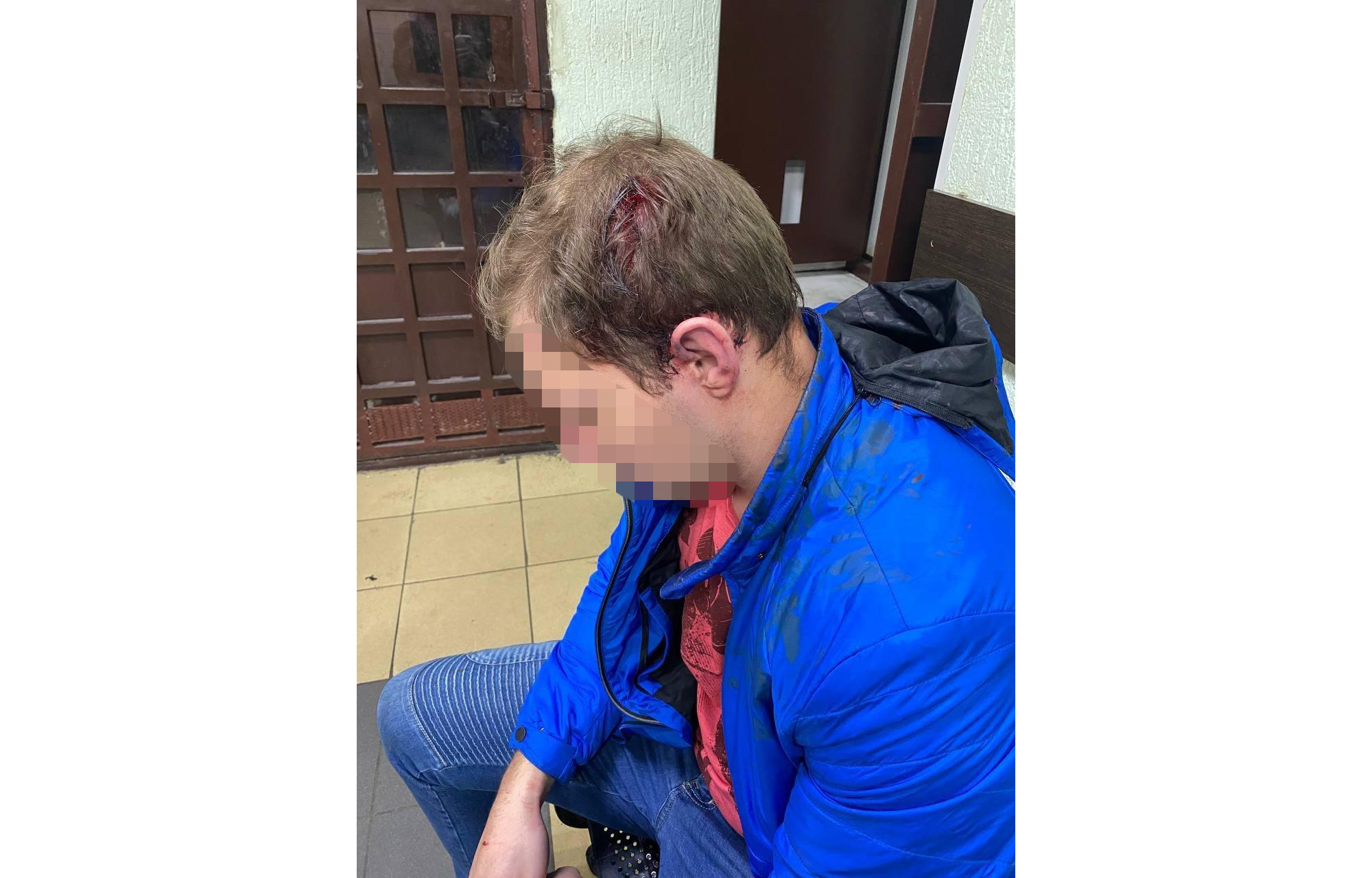
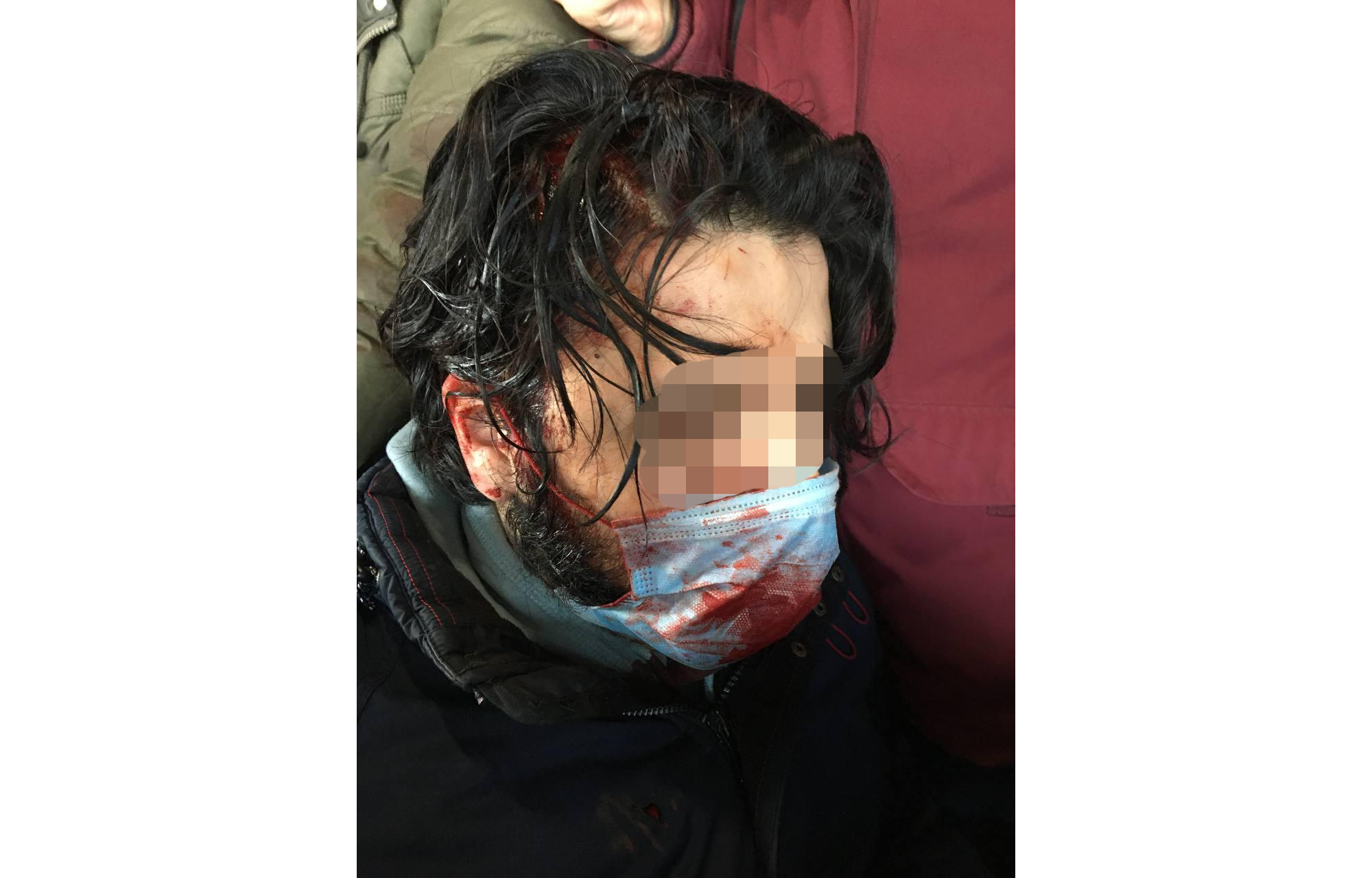
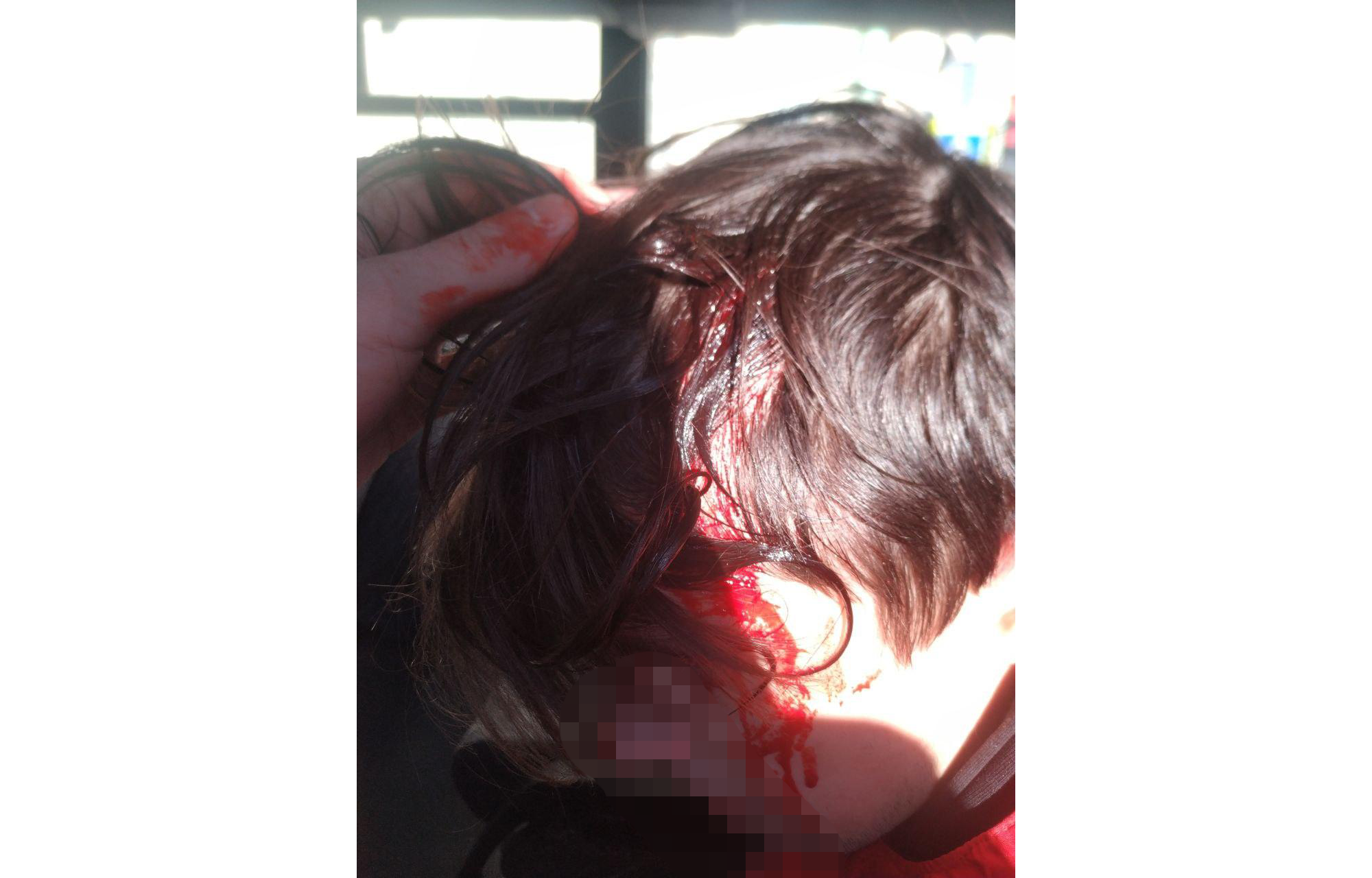
We have recorded at least 39 cases when detainees reported ambulance calls and hospitalization from police departments in Moscow, St. Petersburg and Rostov-on-Don.
For example, in Moscow, at an anti-war rally on February 26, police officers kicked and hit a man's head on the hood of a car because he refused to hand over his passport to them. In St. Petersburg on February 24, the police severely detained an 80-year-old survivor of siege: she was dragged along the ground, and her son's finger was broken.
At least 30 police departments in 9 cities reported to OVD-Info on the use of force against protesters during detention, in a police van or police departments: St. Petersburg, Moscow, Ulan-Ude, Yekaterinburg, Samara, Chelyabinsk, Nizhny Novgorod, Yaroslavl, Vladivostok. According to Agora's assessment, as of mid-February 28, law enforcement officers unreasonably used force against more than 50 detainees at rallies on February 24-28. During the actions on March 6, police officers used force against at least 34 detainees.
At least in three cities – St. Petersburg, Chelyabinsk and Moscow detainees were handcuffed.
In the Moscow DIA “Brateevo” on March 6, police officers openly mocked the detainees: they used violence, threatened, called them the enemies of the people. Similar rhetoric was reported by several other detainees during the entire time of the rallies. This echoes the statement of the Prosecutor General's Office that any assistance to Ukraine will be regarded as treason. The detainees were threatened with a visit by FSS officers, being sent to drug treatment or psychiatric dispensary, initiation of criminal cases on extremism and terrorism, arrests without trial and rape.
Detainees also report damage to personal belongings, broken car windows and phones.
Conditions of escorting and detention
The detainees complained about the difficult conditions of escorting and detention in police stations. Police vans are often crowded and not heated, which causes additional inconvenience when staying inside for a long time. There were complaints about bans on getting food and water, going to the toilet, that the police take away phones and documents immediately when boarding the police van, as well as loud music that the police turn on to make communication difficult.
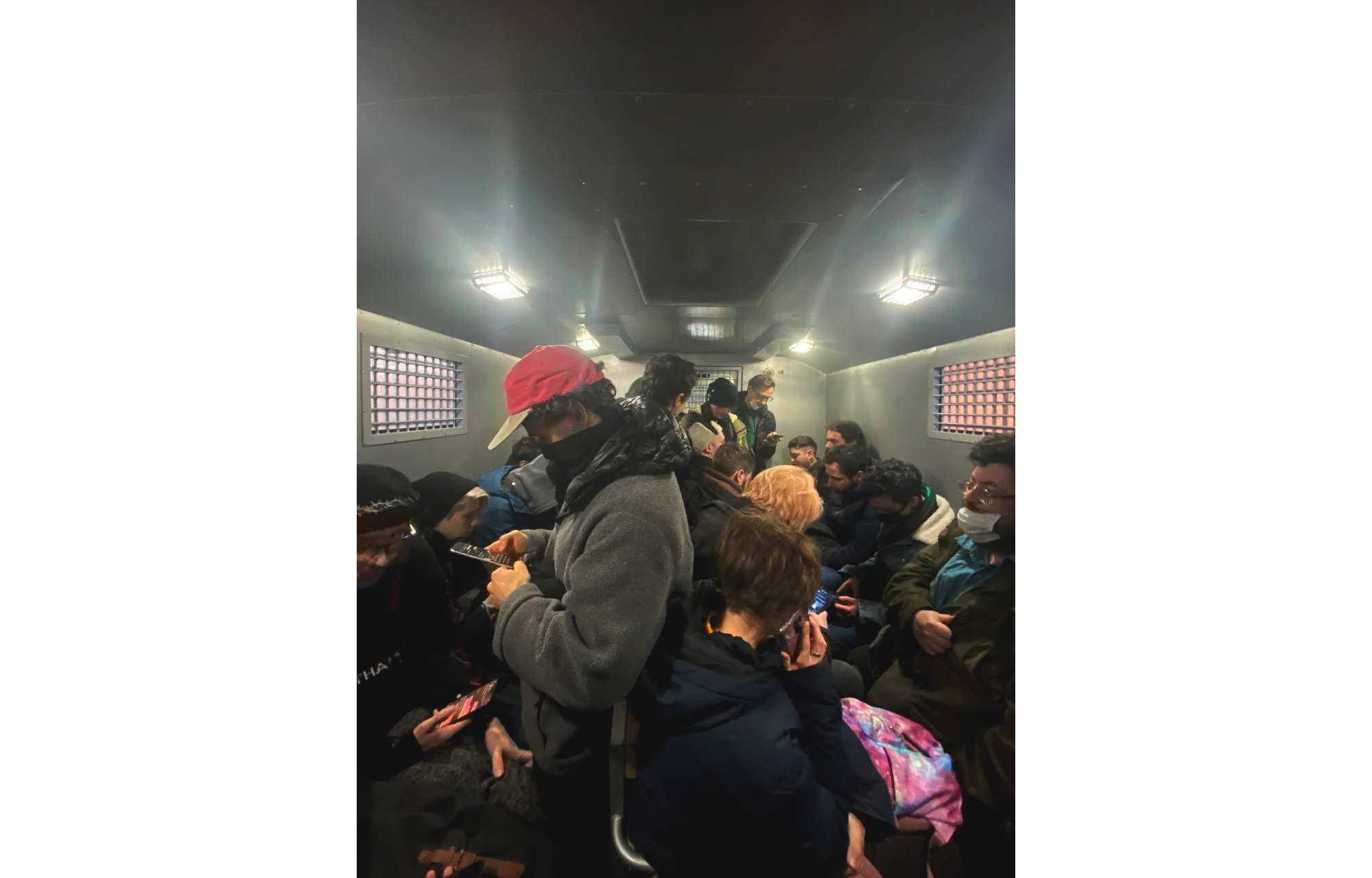
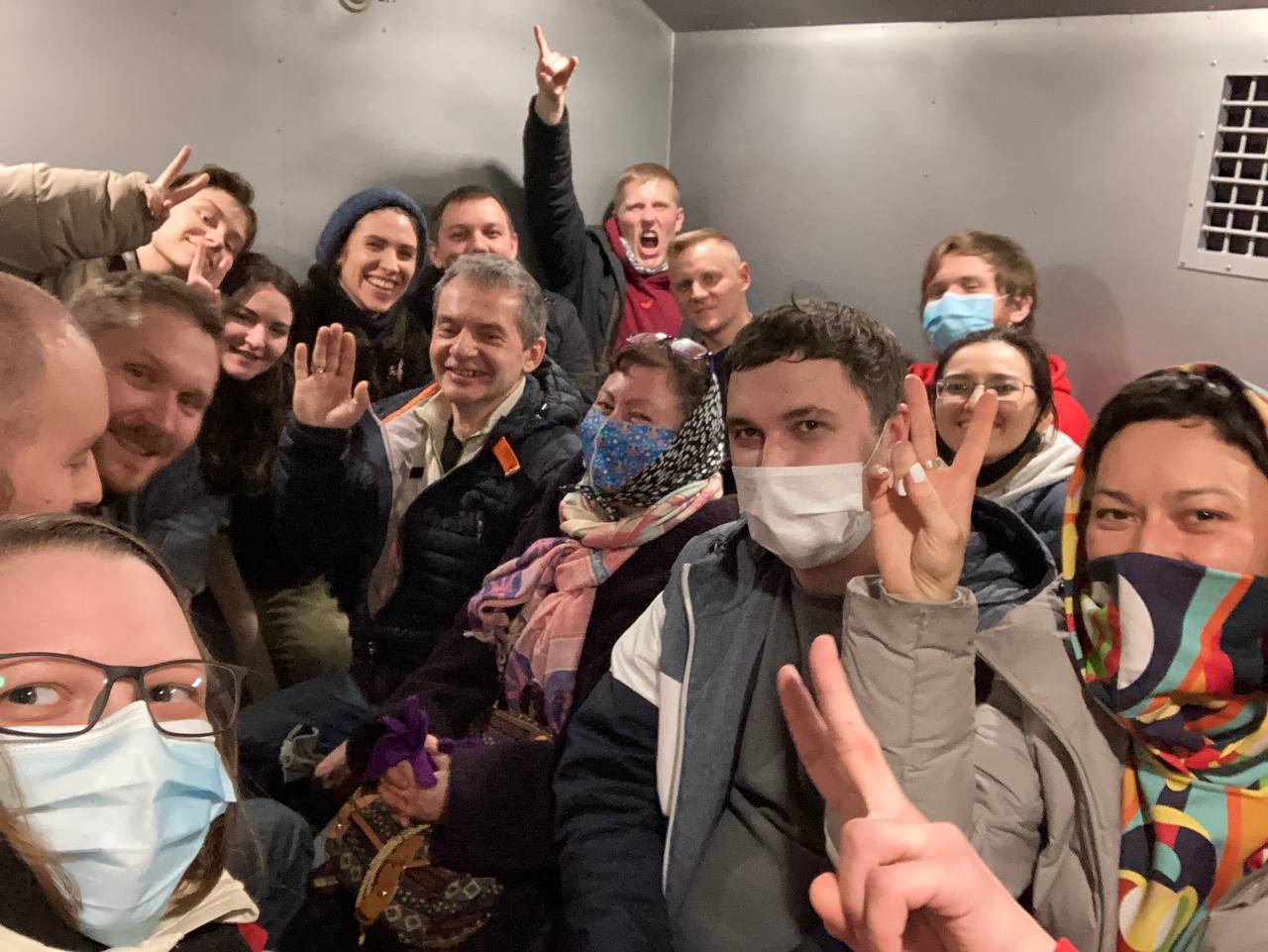
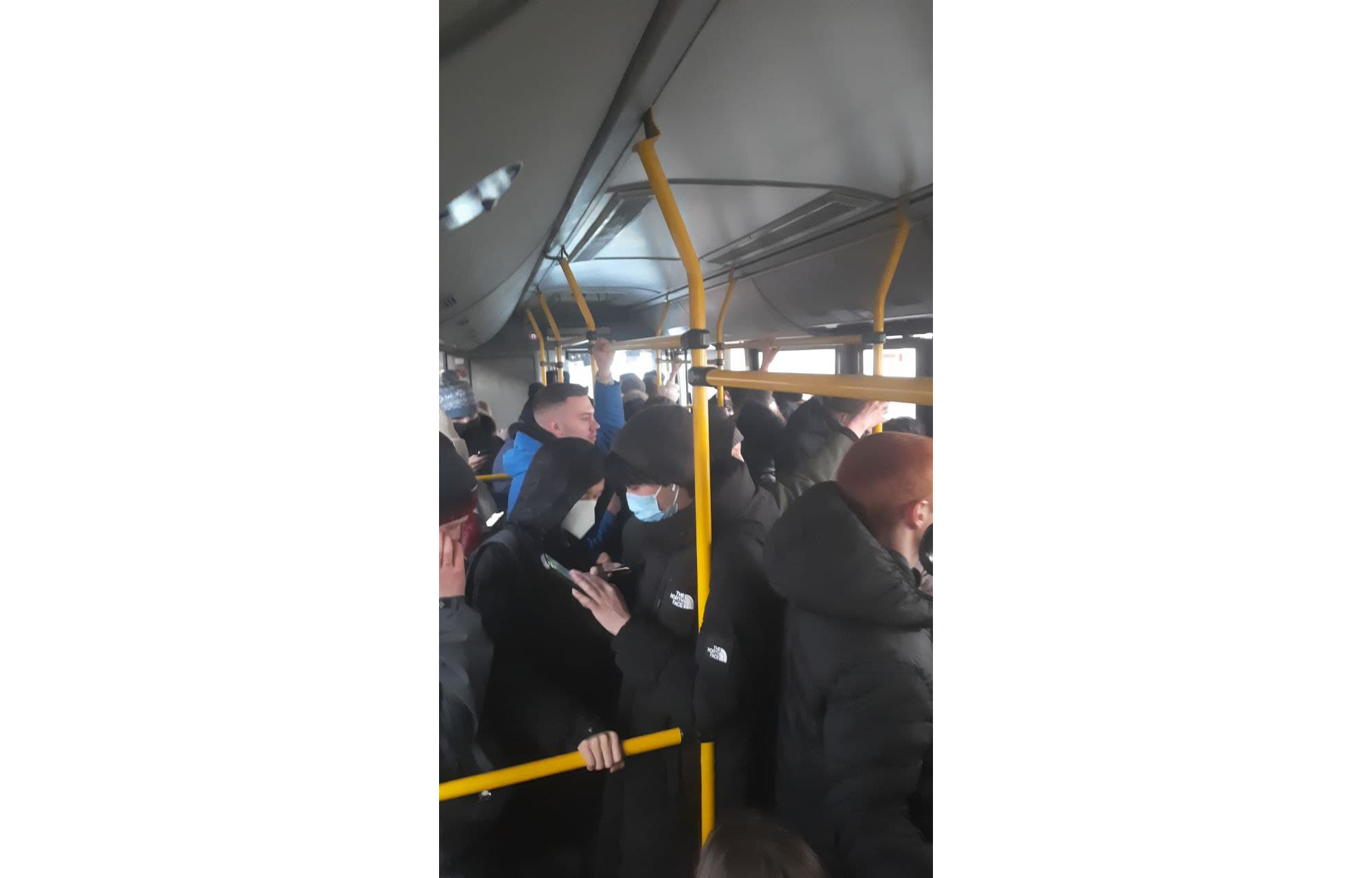
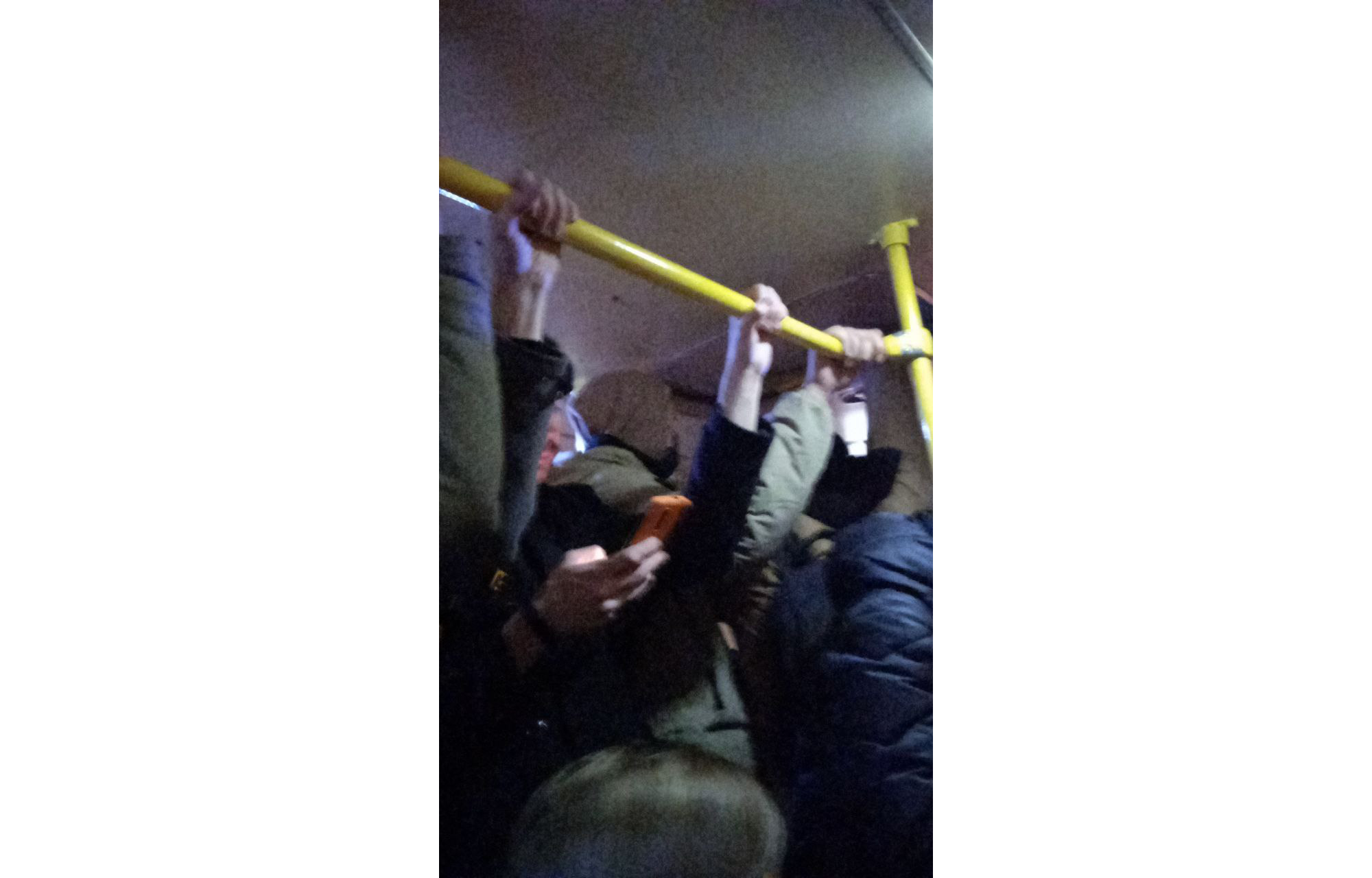
On February 27, a wheel began to smoke at a police van parked near the 35th police station in St. Petersburg, and smoke began to get inside the bus. Some people got sick from the smell, but they refused to let them out on the street.
On March 6, in Moscow, a police van in which detainees were transported at an unauthorised rally was involved in an accident. In total, there were 29 people in the police van. The police noted that as a result of the accident, nine people received minor bruises: six detainees and three police officers.
In the police stations, detainees are forced – with the use of violence – to take fingerprints and photographs, and sometimes even to take DNA samples – we know about more than 300 such cases in 34 police departments. The police also take away phones and documents. When refusing to fingerprint, detainees are threatened with an article about disobeying the lawful request of a police officer (19.3 of the CAO) and being left overnight in the department – in some cases, such threats are realized. Police stations have also received reports of the use of violence and threats especially when detainees refuse to provide information about themselves outside of passport data, which is considered sufficient to draw up a protocol by law.
In the Moscow police departments “Orekhovo-Borisovo Yuzhnoye" and "Nagatino-Sadovniki", the detainees were required to hand over 5-10 phone numbers of those who also oppose the "special military operation". Moreover, at least 75 people who were in other stations told us that their phones were forcibly taken away, flipping through the history of calls and messages.
Often — at least in 75 police departments — detainees left overnight in the stations are not provided with beds, water and food. There are cases when even the food handed over to detainees is not accepted by the police or is taken away by them. In some departments, seeing that the detainees were asleep, the police turned on loud music in the morning to interfere with their sleeping.
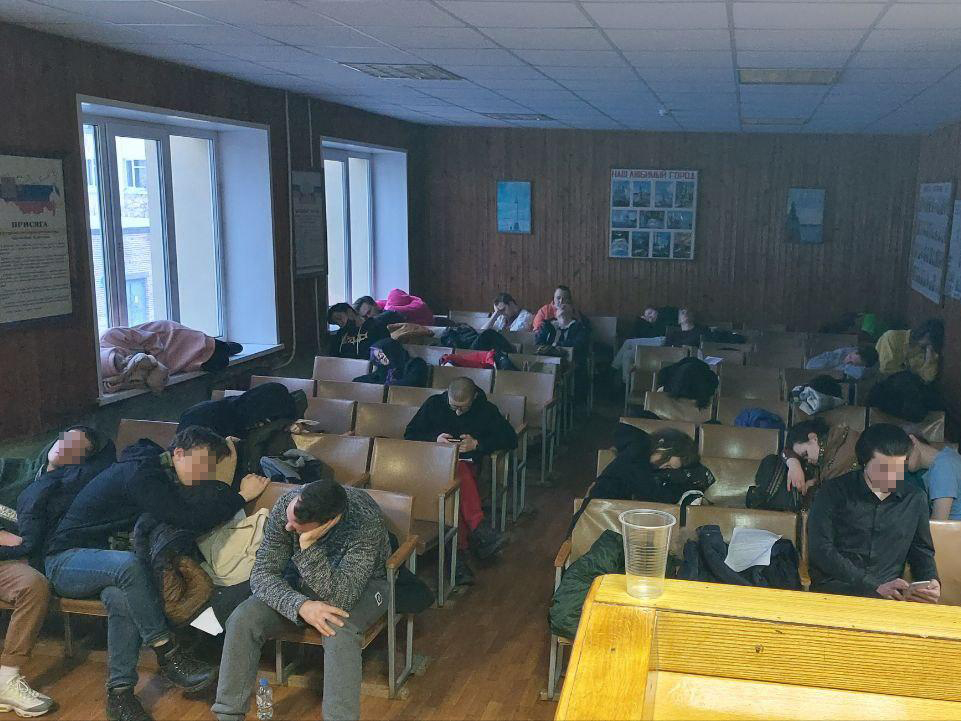
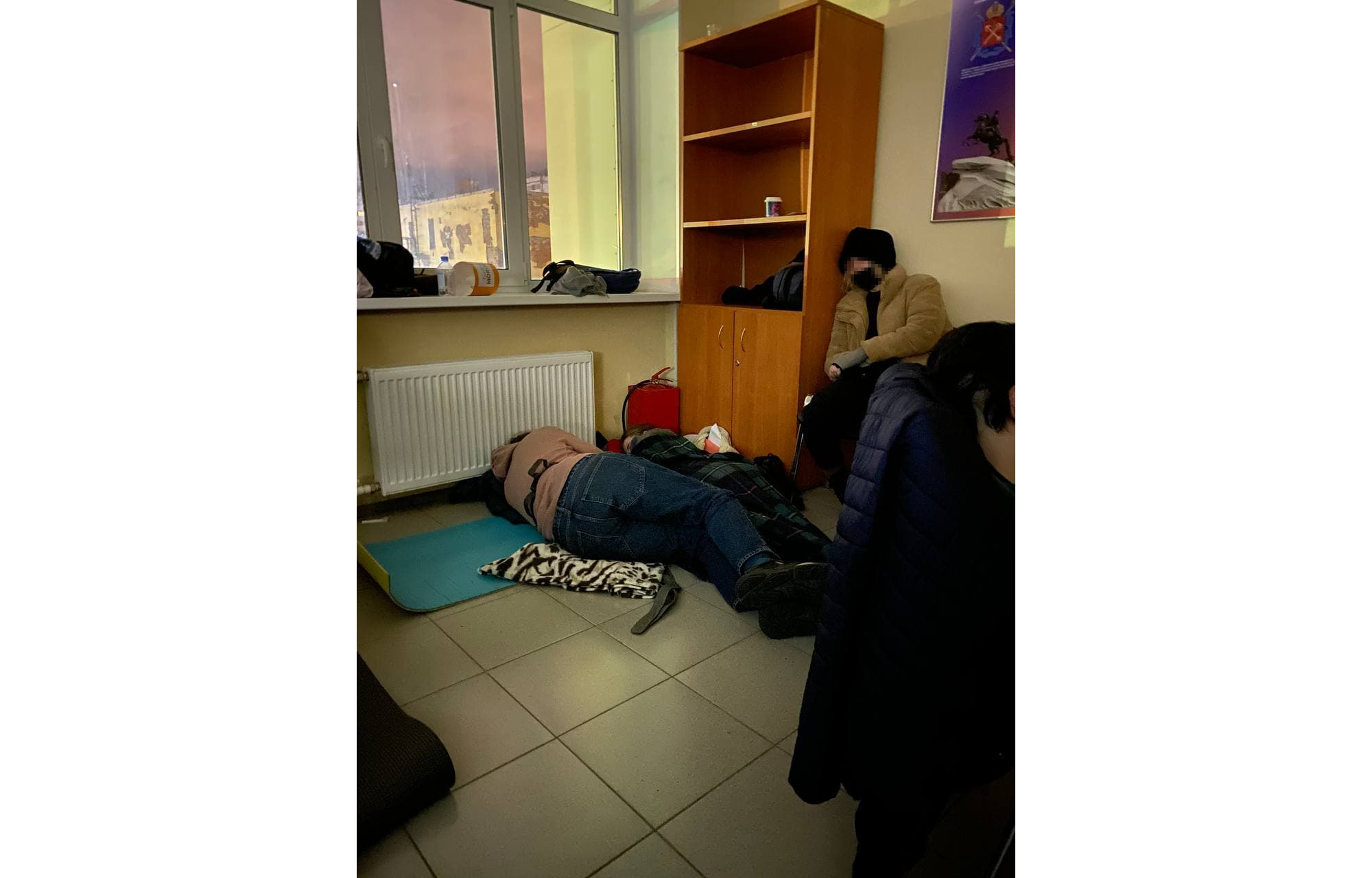
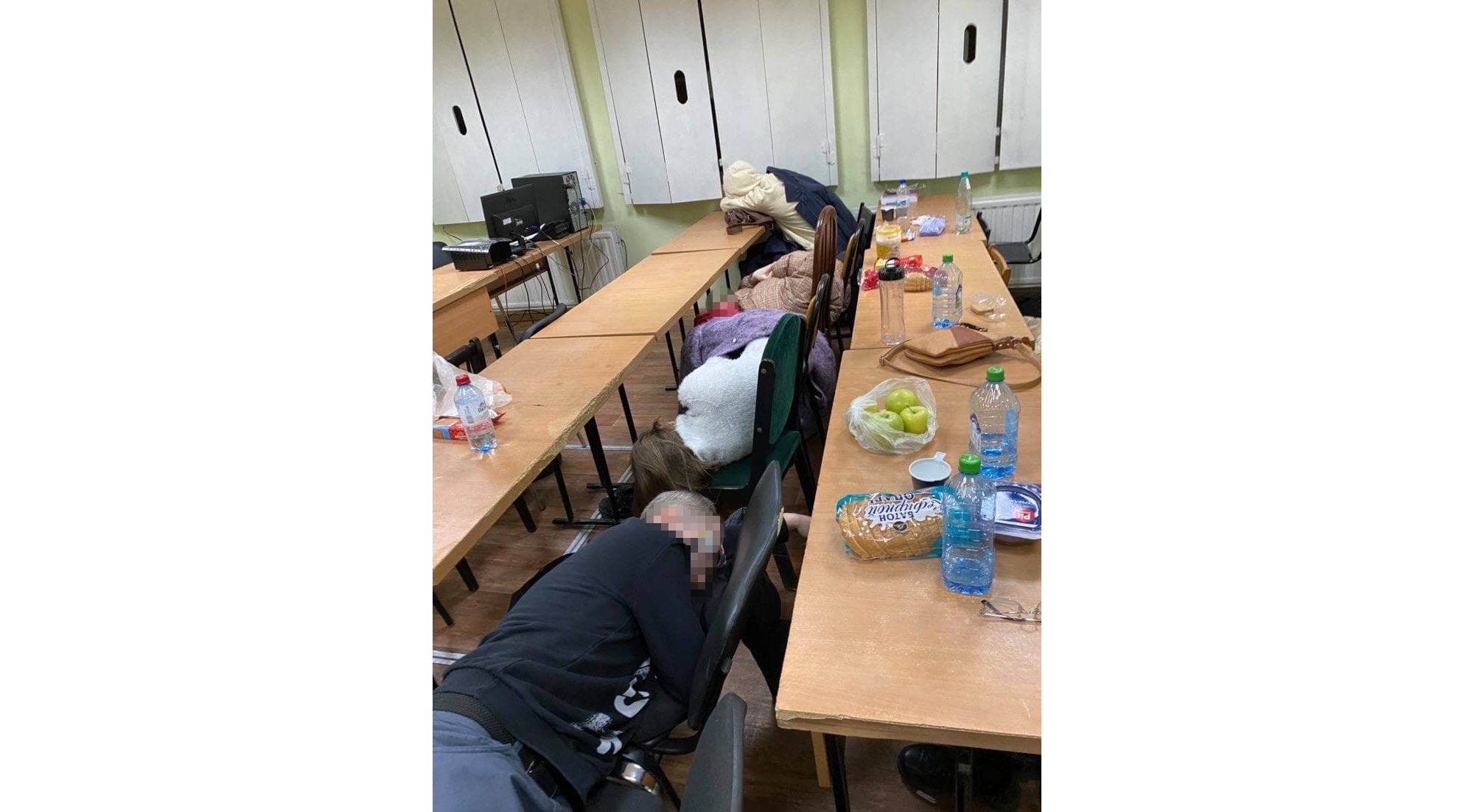
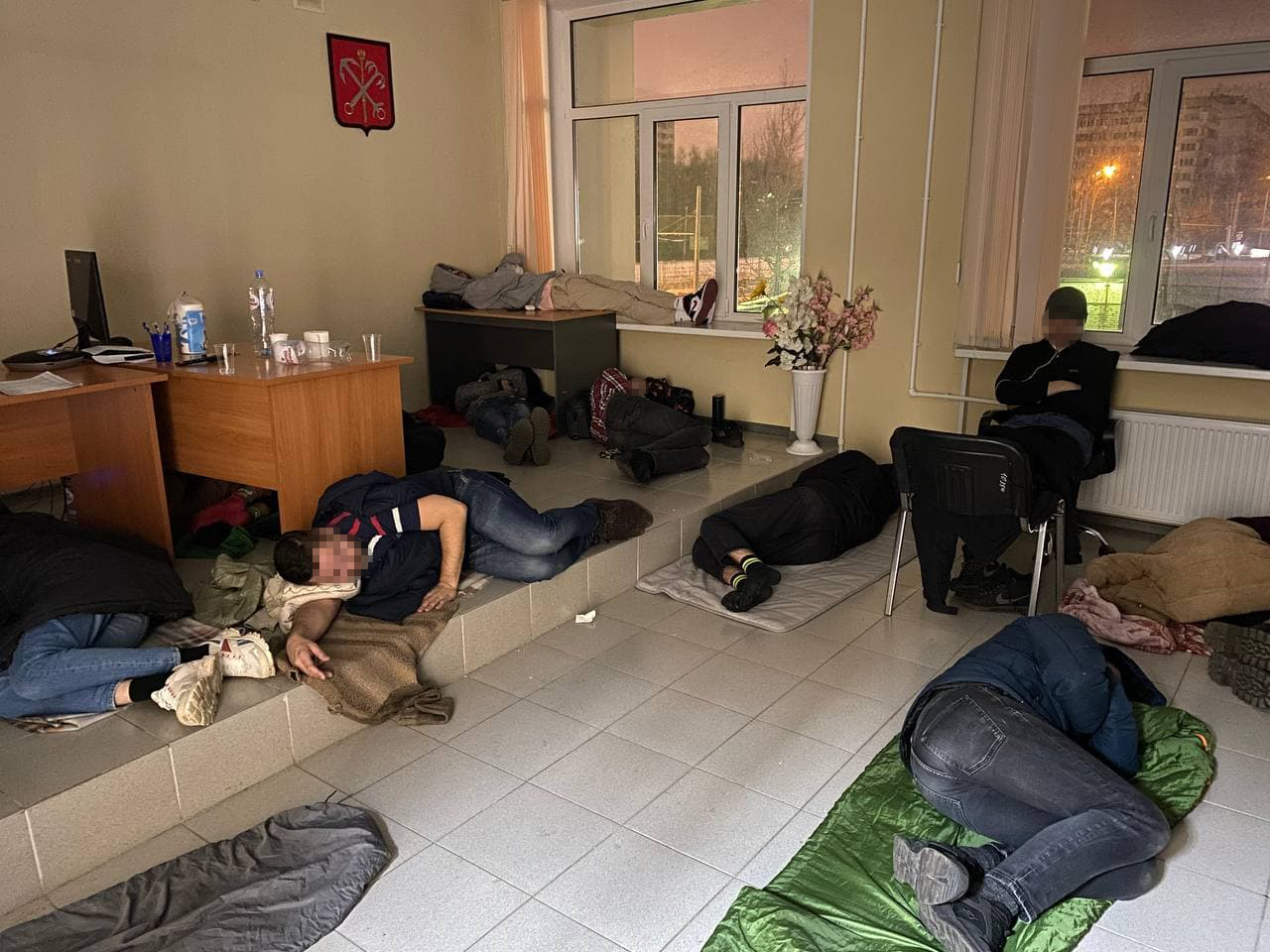
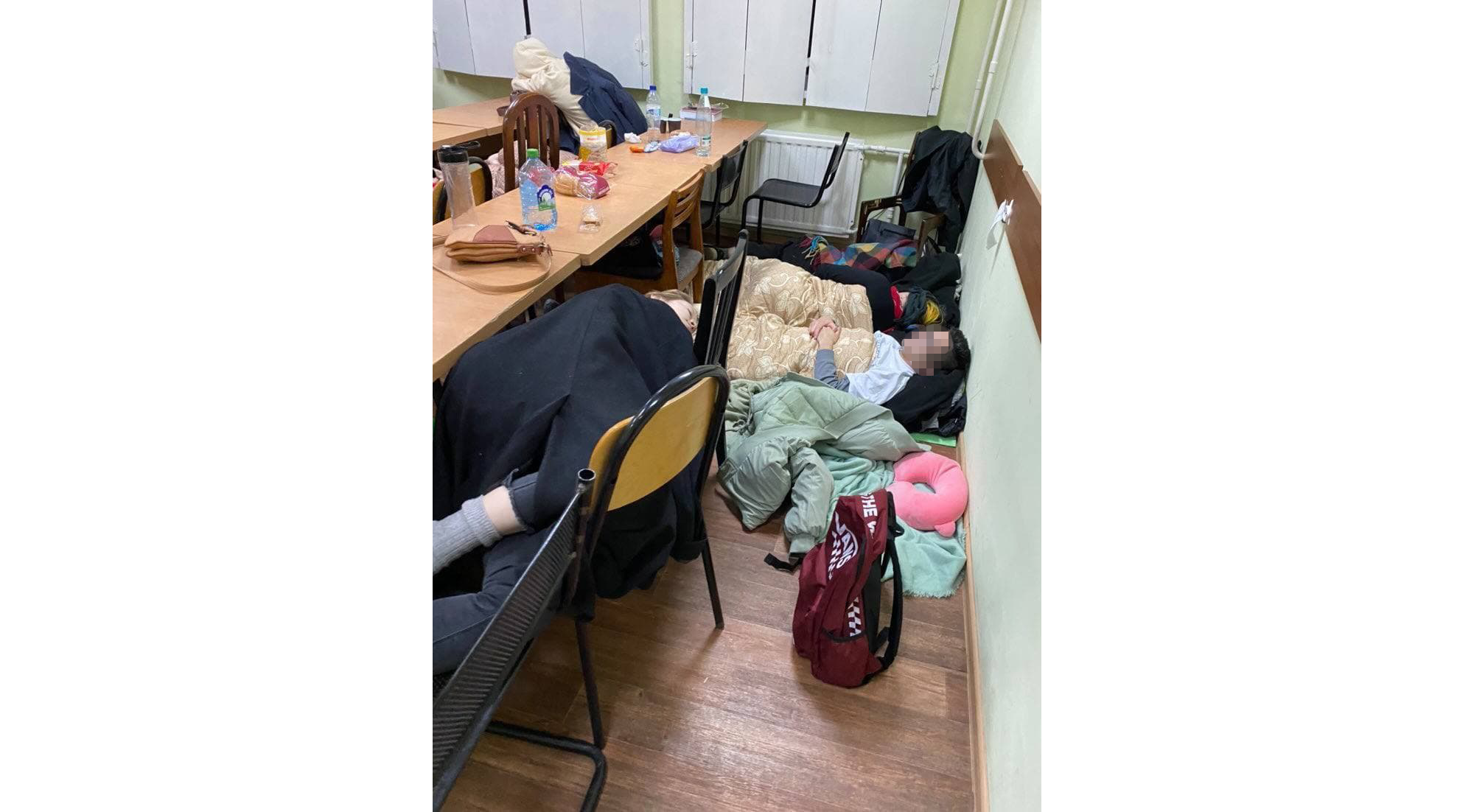
In several departments, the detainees did not even receive vital medications for the treatment of asthma and diabetes that were provided to them. Mikhail Nedopekin, a patient with epilepsy, was left at the DIA of the Academic district for the night.
The police systematically do not allow defenders into the stations. We have recorded cases of non-admission of lawyers and defenders in 89 police stations, at least 18 of them happened because of the introduced «Fortress» plan. Sometimes the defenders were allowed to enter the department itself, but they were not allowed into the hall where the detainees were. Moreover, there were cases when detainees were forced to write a refusal from the defender. In at least 8 cases, defenders were kicked out of the department — or faced another kind of pressure.
On March 7, 2022, in St. Petersburg, lawyer Alexey Kalugin, cooperating with OVD-Info, was not allowed into police station No. 31, where he arrived together with his colleague Sergei Podolsky to represent the interests of one of the detainees at an anti-war rally. The police officer demanded to quit filming, which was conducted by Kalugin, even though despite the fact that the lawyers were outside the gates of the department. Then the attendant hit Kalugin on the phone and began to twist his hands, tried to put handcuffs on the lawyer, but could not cope with it alone — colleagues who ran up helped him, pinning Kalugin to the fence. Kalugin spent about 15 minutes in handcuffs, then the head of the Department of Internal Affairs ordered them to be removed. He accused Kalugin and Podolsky of «defending the Nazis» and therefore being their accomplices. He threatened both of them with instituting cases of violence against a representative of the authorities and insulting a security officer, claiming that the lawyers hit him and insulted him. Then the head of the Department of Internal Affairs allowed the lawyer Podolsky to continue his work, and Kalugin was threatened with an administrative article on disobeying the requirements of the police, but subsequently released him.
Additional methods of pressure on vulnerable groups
Parents and minors
By March 8, we are aware of at least 16 cases of detention of women with children under 14 for a period exceeding the legal norm of 3 hours. In at least eight cases, women were left overnight at the police station. In two cases, the court in St. Petersburg ordered administrative arrest for three days to the mother of a one-and-a-half-year-old child Evgenia Gerasimchuk and 29 days of arrest to a single mother Anna Firsova. Her ten-year-old son was sent to an orphanage during his mother’s arrest.
In two cases, parents were not allowed to see a minor detainee, eight minors were left overnight or sent to a temporary detention facility, as legal representatives could not come to the station. Protocols were drawn up for some parents under the article on non-fulfilment of parental duties (part 1 of Article 5.35 of the CAO).
On March 1, two women and five children aged 7-11 who came to lay flowers at the Embassy of Ukraine were rudely detained in Moscow — they were kept at the police station for more than 3 hours and threatened to be left overnight and deprived of parental rights.
We are also aware of at least 29 cases of additional police pressure on foreign citizens. They were accused of violating migration laws, threatened with deportation, separated from the rest of the detainees, not allowed to visit the lawyers who arrived and were interviewed by FSS officers.
Administrative prosecution
The authorities are actively pursuing the protesters and all those who publicly express an alternative opinion about the «special military operation». As of March 10, we are aware of at least 712 administrative arrests, the average duration of which is about 10 days (from 1 to 30 days).
The detainees were accused of disobeying the lawful order of a police officer (Article 19.3 of the CAO), violating the restrictions imposed to combat the spread of COVID-19 (failure to comply with the rules of conduct when introducing a high-alert regime, 20.6.1 of the CAO, or its regional analogues), organizing an unauthorised event (Part 2 of Article 20.2 of the CAO), and most often — violating the procedure for holding a public event (Part 5 of Article 20.2 of the CAO). In addition, other parts of Article 20.2 of the CAO were also applied: Part 6.1 on participation in an event that interfered with the functioning of infrastructure, pedestrian traffic and transport, or Part 8 on repeated violation of the procedure for holding a public event. Article 20.2.2 was popular in St. Petersburg. CAO on the organization of mass simultaneous stay and (or) movement of citizens in public places that have caused a violation of public order or sanitary norms and rules. On the websites of district courts that deal with the cases of «violation of the rules for holding public events», as of March 14, we managed to find information on 9922 cases under article 20.2 and 20.2.2 of the CAO that have been submitted to the courts since February 24.
As mentioned above, people are regularly attracted to the charges of organizing an unauthorised rally for posting on social networks. So, on February 28, the Kuibyshev District Court of St. Petersburg found Yevgeny Zateev, coordinator and press secretary of the Spring movement, guilty of organizing an unauthorised rally because of a post on social networks with a pacifist call to gather at Gostiny Dvor and arrested him for nine days.
According to data from the courts' websites, a total of 259 cases were initiated from February 24 to March 6 under Part 2 of Article 20.2 of the CAO, according to which the authors of posts in social networks about upcoming rallies are mainly prosecuted.
As of March 8, cases under the new article 20.3.3 of the CAO appeared during this time in at least cities of Russia. The reason for the initiation of administrative proceedings may be the inscriptions «No war» or posters mentioning the war. If they are accompanied by a call to participate in the rally, the second part of the article is applied, assuming a larger fine. There are at least 144 protocols under this article that we already know of — the list will obviously continue to grow. As of March 11, at least 14 indictments have already been issued under this article with penalties in the form of fines from 30 to 60 thousand rubles. Special attention should be paid to the drafting of a protocol on the rector of the Church of the Resurrection of Christ in the village of Karabanovo, Kostroma region, Father John Burdin for his anti-war sermon. The official Orthodox Church, represented by Patriarch Kirill, on the contrary, supported the «special operation».
As of March 9, we are aware of 17 cases of non-admission of lawyers to the courts. In the Nevsky District Court of St. Petersburg, the bailiffs told the lawyer Maria Belyaeva, who cooperates with OVD-Info, that she was not a participant in the process. And lawyer Fyodor Voskresensky was not allowed into the Krasnogvardeysky district Court even after the bailiffs were called by the judge and informed that he was admitted as a defender. In the Kalininsky District Court of St. Petersburg, the detainees were required to refuse lawyers, promising to impose a fine, otherwise, arrest.
Administrative prosecution: UPD 14 April
As of April 12, we are aware of at least 960 arrests in connection with protests in thirty-three regions of Russia, as well as in Crimea. Most of them are in St. Petersburg (450), Moscow (298), Rostov Region (63), and Krasnodar Krai (31).
The duration of the arrests which we know about ranges from 1 to 30 days, the average duration is 11 days.
As of April 13, we are aware of at least 993 cases in seventy-eight regions under Article 20.3.3 of the CAO on discrediting the Russian armed forces.
In explanatory dictionaries, including Ozhegov’s dictionary, «discrediting» is understood as undermining trust, belittling the authority of someone or something. There is no definition in the law itself.
In reality, «discrediting» is imputed for:
- demonstration of posters with the inscriptions «PEACE», «I AM FOR PEACE», «NO WAR», «NO WAR», «FASCISM WILL NOT PASS», «TIME TO LOVE, NOT TO THROW BOMBS», «ППП» (various interpretations possible), «*** *****», etc.;
- the use of the term «war» in the inscription «NO WAR»;
- the use of anti-war slogans;
- «silent support» of the anti-war rallies;
- demonstration of a poster painted in the colours of the Ukrainian flag with the inscription «I am against the 'special operation'», etc.;
- demonstration of the flag of Ukraine;
- posting a poster with a thematic content in the window;
- wearing a protective mask and clothing items with the text of thematic content;
- wearing a green ribbon on clothes;
- participating or being near an anti-war rally;
- anti-war statements outside protest rallies;
- anti-war publications, memes, photos and videos, comments on social networks, etc.
As practice has shown, detainees at anti-war rallies are often brought to administrative responsibility simultaneously under two articles: 20.3.3 and 20.2. of the CAO. Moreover, we noted a deterioration in the quality of proof of guilt in the protocols under Article 20.3.3 of the CAO. There is a known case when law enforcement officers used the Yandex search engine to justify the guilt of a person in discrediting the armed forces of the Russian Federation.
In addition, now, it is also known about two cases initiated under Article 20.3.4 of the CAO (calls for sanctions) in the context of the imposition of sanctions due to Russia’s aggression against Ukraine.
- Olga Komarova, the director of the publishing company of the Gorno-Altaysk weekly newspaper «Listock», was summoned to the prosecutor’s office to draw up a resolution because of an article published on March 30, 2022. According to the founder of the newspaper Sergey Mikhailov, the article talked about restrictions on entry to other countries for regional officials.
- Also, on March 28, 2022, the Lefortovsky District Court of Moscow fined Vladislav Arinichev 35 thousand rubles because of a video in which Arinichev talked about the imposition of sanctions.
Since the beginning of the war, we have recorded at least 153 cases of non-admission of lawyers to detainees in 105 police offices in nineteen cities of Russia. In twenty-three such cases, the «Fortress» plan was used.
Since February 24, police officers have taken phones from detainees or demanded access to them in at least sixty-four police stations, which undoubtedly makes it difficult to contact defence counsels, as well as to record violations for their further work. Moreover, there were cases when detainees were threatened when trying to contact advocates and forced to refuse their professional assistance.
Criminal prosecution
As of March 12, 21 criminal cases are known, allegedly related to the people’s reaction to a «special military operation» in Ukraine. Detailed information about cases is not always available.
At least six cases have been initiated against people who took part in anti-war rallies. All of them were initiated under the article on the use of violence against a representative of the authorities (Article 318 of the Criminal Code provides for punishment, depending on the part from a fine of up to two thousand rubles to imprisonment for up to 10 years). Three cases were initiated in St. Petersburg, two in Yekaterinburg, one in Moscow.
The Investigative Committee commented on one of the St. Petersburg cases: «The investigators will give the harshest legal assessment of each fact of an attack or the commission of other illegal actions against government officials standing guard over law and order».
One case was initiated in St. Petersburg because of an anti-war performance: two people are suspected of hooliganism for burning an effigy in camouflage with a bag on his head and the inscription «TAKE AWAY».
Another case is also connected with something like an anti-war performance that happened during a mass rally: under the article on hooliganism (Article 213 of the Criminal Code provides for punishment: if committed alone and without weapons — up to five years in prison, if with weapons, in a group or associated with resistance to a representative of the authorities — up to seven) in Moscow, a case was opened against the driver of a car with the inscriptions «People, get up!» and «This is war!» who drove a car onto the sidewalk on Pushkin Square, damaging the metal fence, and then set fire to the salon.
Four cases were initiated under the article on vandalism (Article 214 of the Criminal Code, provides for punishment up to imprisonment for three years) for anti-war inscriptions: in Vladimir, Belgorod, Feodosia and Novomoskovsk. Local activists and employees of the Internet publication «Dovod» came to the Vladimir case with searches.
In Chita, due to a video about Russian servicemen in Ukrainian captivity, a case was initiated under the article on the public dissemination of deliberately false information about circumstances that pose a threat to the life and safety of citizens (Article 207.1 of the Criminal Code provides for punishment from a fine of up to 700 thousand rubles to restriction of freedom for up to three years).
In Vladivostok and Tyumen, because of statements in social networks, cases were opened on calls for extremist activity (Article 280 of the Criminal Code provides for punishment in the form of imprisonment for up to four or five years, depending on the part of the article).
Another case of the use of violence against a representative of the authorities was initiated in Moscow actually because of anti-war symbols: traffic police officers stopped the car because of an anti-war white-blue-white flag placed on the car, after which, according to investigators, the driver’s girlfriend tried to escape, and he used violence to a policeman who tried to catch up with her.
Finally, five more cases are not formally related to anti-war protests, but the fact that they were initiated right now against political activists suggests that these persecutions are also part of the campaign against pacifists. Three cases — in St. Petersburg, Samara and Kazan — were initiated under the article on a deliberately false report of a terrorist attack (part 2 of Article 207 of the Criminal Code, provides for a penalty of up to five years in prison). At least 12 activists are being investigated in St. Petersburg, and searches were carried out at at least 59 addresses. Two more cases were initiated in Novosibirsk against assistants of local deputies under the article on fraud (Part 1 of Article 159 of the Criminal Code, provides for punishment up to two years in prison): both were accused of fraudulently stealing money from the City Council.
In at least three cases from the criminal cases known to us, videos of the persecuted were published in which they apologized for their actions.
Bringing to criminal responsibility persons who publicly express their opinion about Russia’s armed hostilities in Ukraine is another tool of censorship and intimidation of those who disagree with these actions. This measure has a deterrent effect on everyone who would like to speak out not so much against the «special operation» but for peace, as well as to express their solidarity and support to the residents of Ukraine. Taking into account the amendments to the Criminal Code that have entered into force, allowing to bring to justice those who disseminate false information about the actions of the Russian armed forces or discredit their use, it can be assumed that there will be an increase in cases of criminal prosecution of persons for any anti-war rallies and statements.
In addition, the Prosecutor General’s Office stated that participation in anti-war rallies could be regarded as participation in the activities of an extremist organization (part 2 of Article 282.2 of the Criminal Code, provides for punishment up to imprisonment for up to six years). «It should be borne in mind that the source of many such appeals is associations banned by a court decision on the territory of the Russian Federation in connection with their extremist activities», the ministry said. Apparently, the statement is related to the fact that the call to participate in rallies against the war with Ukraine was published in the accounts of Alexei Navalny. Structures associated with Navalny — The Anti-Corruption Foundation (FBK), the Citizens' Rights Protection Foundation (FZPG), and headquarters in different regions of Russia on June 9, 2021, were recognized as extremist organizations and banned.
Criminal prosecution: UPD 14 April
As of April 14, we became aware of at least 26 cases in 16 regions initiated under the new Article 207.3 of the Criminal Code of the Russian Federation, which provides for liability for the public dissemination of deliberately false information about the use of the armed forces or the performance by state bodies of their powers outside the Russian Federation. At the same time, one of the cases was initiated against a minor resident of Novosibirsk.
The reasons for criminal prosecution were posts, reposts and comments on social media and Telegram channels. For example, the deputy of the Omsk City Council Dmitry Petrenko was accused of posting on his Telegram channel the message «with information and photos of destroyed residential buildings and children with injuries suffered from alleged airstrikes and artillery strikes by the Armed Forces of the Russian Federation» with «using his official position».
According to the advocate Daniil Berman, defending the former reserve control point technician of the capital’s main Ministry of Internal Affairs directorate, Sergei Klokov, who is accused under part 2 of Article 207.3. The decision to initiate the case refers to the dissemination of «false information» during a telephone conversation, and the criterion of «publicity» is not justified in any way. The investigation claims that it was a «collective crime motivated by political and national hatred», and Klokov had a «dismissive, unfriendly, hostile and aggressive attitude towards the Russian people and the Russian Federation as a whole».
You can read more about criminal cases against those who disagree with the war in our guide — in total we know about 84 convicted in criminal cases.
Conclusion
There is a sufficient probability that the already existing repressive practices will expand. In the first two weeks, the authorities have tested new instruments of repression, and so far, there is no reason to believe that the state will stop there. After the amendments to the Criminal Code on «fake news» adopted by the State Duma, we have yet to see the scale and seriousness of the law enforcement of the updated law. Independent media and other information resources are shut down or stop writing about the war. It is becoming more and more dangerous for ordinary citizens to disseminate information and express a point of view different from the official one in any way. Open letters and posts about them are already being deleted from social networks or edited so that the signatories do not fall under the new repressive laws.
Anti-war protests have been taking place every day for two weeks. Even though, contrary to the statements of the Prosecutor General’s Office, the protesters are not yet attracted as extremists, most likely the punishment for such rallies will be tightened. Representatives of projects assisting detainees also take a significant risk by publishing information about protests and the number of detentions, advising detainees in police stations, providing them with defenders in courts.
By increasing censorship, destroying independent media and brutally suppressing protest, the Russian authorities seek to stifle public discussion, isolate and marginalize those who speak out against the war or help persecuted people. The negative consequences of such actions are very likely to manifest themselves in various spheres of public life for a long time to come.
It is important to note that neither mass detentions nor violence against protesters is anything new for Russian reality. The authorities use the experience gained over the past years to suppress the anti-war protests. In recent years, the scale of detentions has only increased, and the applied pressure measures have become tougher. Now, the number of detainees at anti-war protests is gradually approaching the historical maximum for modern Russia while still yielding quantitatively to the mass detentions of the beginning of 2021. At the same time, the infrastructure and regulatory framework for mass arrests and detention of people in almost torture conditions have been created for years. This includes prohibitive legislation, cases of police violence that are not investigated from year to year, and ignoring the deplorable state of many means for transporting and detaining people.
The foundation for mass blocking of mass media and information platforms has also long been laid by legislation on the «sovereign Internet», the media «foreign agents», laws on countering extremism and terrorism with their most vague formulations. In 2021, many Russian media and journalists were included in the registers of «foreign agents», some publications had to stop working, some resources were blocked. Against the background of the COVID-19 pandemic, the restrictive practice of applying legislation against «fake news» has developed, which in practice declares any information that does not correspond to the state position. Now, in crisis conditions, we are witnessing how easily the authorities can suppress freedom of expression using the tools at their disposal.
The problem of legislation on «foreign agents» deserves special attention. In recent years, this label has become one of the main tools of the authorities' suppression of civil society in Russia. In a military context, the term «foreign agent» fits perfectly into militaristic rhetoric. In the first two weeks of the war and the suppression of the anti-war protest, the State Duma has already discussed the creation of a unified register for individuals: «foreign agents», which implies the expansion of this concept and the inclusion of new categories of persons, for example, employees of organizations declared foreign agents.
The situation is developing rapidly. Detentions of protesters, blocking of the media and the adoption of new restrictive rules occur almost daily.
You can follow the update of information about political persecution in the context of the war in the following updated materials of the OVD-Info.
- Rallies in support of the people of Ukraine and against the war
- Courts and other pressure due to rallies in support of the people of Ukraine and against the war
- «Anti-war case»: OVD-Info guide
- Daily updated chronicle of the suppression of anti-war protests in English
Summary
During the first two and the half weeks of the war in Ukraine and the suppression of anti-war protests in Russia, 14,906 people were detained in more than a hundred cities. There are at least 170 minors among the detainees.
During detentions and in police stations, law enforcement officers used force: people were knocked to the ground, dropped on the asphalt, beaten with batons, strangled, punched in the stomach, face, eyes, hit their heads against the wall, twisted and wrung their hands. There have been multiple reports of the use of stun guns from St. Petersburg. At least 39 times, police stations reported an ambulance call and hospitalization. Detainees face open bullying and torture by the police, accusations of betrayal of the Motherland, threats of criminal prosecution for extremism and terrorism, as well as threats of sexual violence. In police stations, people’s phones are taken away; they were required to report the contacts of acquaintances who oppose the «special operation», fingerprints were taken without legal grounds, photographs were taken, DNA samples were taken and interrogated. The detained foreigners attract special attention from the police: they are threatened with deportation, additionally interrogated, including by FSB officers.
In addition to violence and torture, detainees face difficult conditions while being escorted and detained in police stations. Some people are kept for hours in unheated and overcrowded car parks without the opportunity to use the toilet; water and food are not always handed over to stations in police departments; not everyone has a sleeping place during prolonged detention. There are cases when police officers turned on loud music at night so that detainees could not sleep.
The authorities are trying to isolate the detainees, not letting advocates and lawyers to them. In addition to the announcement of a special security «Fortress» plan, which implies a ban on entering and exiting the police stations, advocates are not allowed to the detainees, referring to a certain «order» or without explaining the reasons at all. Advocates and lawyers who help detainees are subjected to pressure and physical violence.
Mass detentions at anti-war protests occur in parallel with the trials of those detained at the rallies, as well as those who were detained after the fact using a facial recognition system. As a rule, detainees are charged with violating the conduct or participation in a public event, disobeying a lawful request to police officers, as well as violating coronavirus restrictions. By March 14, at least 9922 administrative cases under Article 20.2 and 20.2.2 of the CAO are known. Also, as of March 8, it is known about the application of a new article against protesters in at least 15 cities on «public actions aimed at discrediting the use of the Armed Forces of the Russian Federation to protect the interests of the Russian Federation and its citizens, maintaining international peace and security». In the courts, detainees at protest rallies face a conveyor approach to the consideration of cases, a lot of procedural violations, including the non-admission of defenders, as well as an overwhelming accusatory bias. Detainees receive arrests and fines costing thousands.
The formal basis for mass detentions is the unauthorised status of the rallies. Russian legislation does not provide for spontaneous rallies, and in some cities, the situation is aggravated by the complete ban on assemblies and solo demonstrations due to the pandemic. At the same time, the rallies themselves are peaceful, as evidenced even by the materials of administrative cases against detainees. Individual cases of violence blamed on the protesters are isolated from the main manner of the rallies and do not make the protest itself not peaceful.
By March 12, 21 criminal cases were known, allegedly related to people’s reaction to a «special military operation» in Ukraine. The defendants are accused of using violence against police officers, hooliganism, vandalism, dissemination of deliberately false information, calls for extremist activity. This number also includes at least five criminal cases that are not directly related to the rallies, but they appeared during the protests and were either initiated against activists or involved activists as witnesses. In addition, the Prosecutor General’s Office stated that participation in «illegal» rallies can be qualified as participation in the activities of an extremist organization.
Relatives of detainees also face persecution and negative consequences. Thus, protocols are drawn up for the parents of detained minors under the article on non-fulfilment of parental duties, there are cases of arrest of mothers of young children and placement of children in a shelter for the time of the mother’s arrest. In addition to administrative and criminal prosecution, other forms of pressure on protesters are also known. It is known about university expulsions and dismissals for participating in anti-war rallies and initiatives. People and organizations that have signed anti-war petitions or are participating in other initiatives are visited by law enforcement officers, threatened by phone and physically assaulted.
Mass detentions and other types of persecution of those who oppose the «special operation» are taking place against the backdrop of a large-scale state campaign to strengthen censorship and propaganda. Over the past two weeks, dozens of media and information resources have been blocked in Russia, many news sources have been ordered to remove materials covering the war in Ukraine, and several editorial offices have decided not to write on this topic. Social networks Facebook and Twitter were also blocked.
The authorities are adopting new laws that establish or strengthen responsibility for certain forms of dissemination of objectionable information. In particular, penalties have been introduced for the public dissemination of deliberately false information about the use of the Russian armed forces and for discrediting the use of the Russian armed forces, including calls for unauthorised public events, as well as for sanctions against Russia. The Prosecutor General’s Office also stated that «the provision of financial, logistical, consulting or other assistance to a foreign state, international or foreign organization or their representatives in activities directed against the security of the Russian Federation» contains elements of an offence and provides for punishment in the form of imprisonment for up to 20 years. On March 10, in the second reading, the State Duma deputies adopted a draft law on the creation of a unified register of individuals: foreign agents, where it is proposed to include current and former employees of organizations declared foreign agents.
Along with the increasing pressure on independent media, propaganda is gaining new proportions: special classes are held in schools and universities, where the reasons for the «special operation» in Ukraine are explained; demonstrations are organized in support of the Russian army; militaristic symbols are planted in budgetary and state-close institutions.
Summary: UPD 14 April
Seven weeks have passed since the beginning of the Russian invasion of Ukraine and four weeks since the publication of our report on the suppression of anti-war protests in Russia. Since the beginning of the war, we are aware of about 15,428 detentions: protesters, journalists, and bystanders. The peak of detentions occurred in the first weeks of the war; most people were detained during the rallies on March 6 — at least 5,558 people in seventy-seven cities of Russia. The detentions were accompanied by police violence: people were knocked to the ground, dropped on the asphalt, beaten with police truncheons, strangled, punched in the stomach, face, eyes, hit their heads against the wall, twisted and wrung their hands.
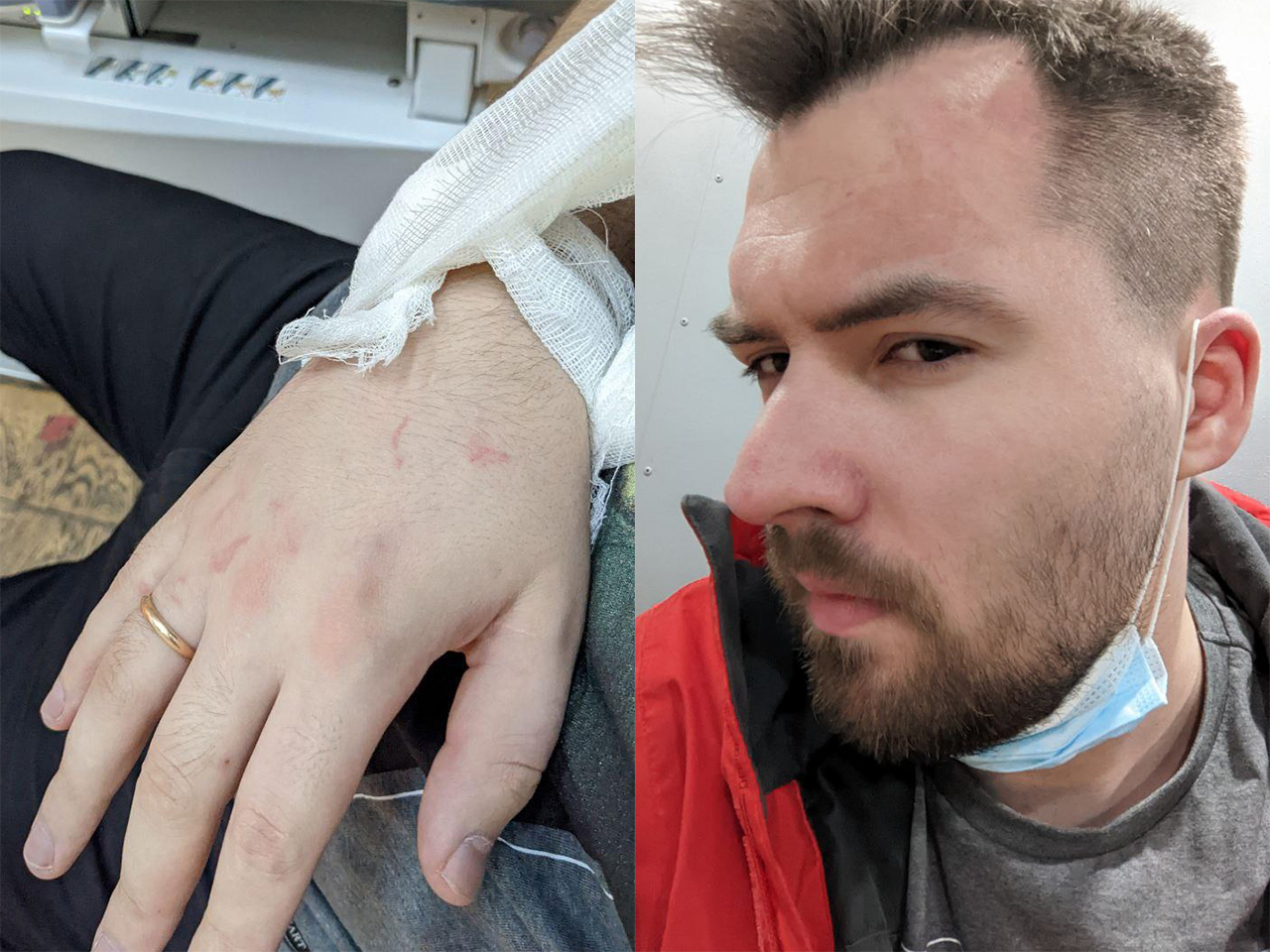
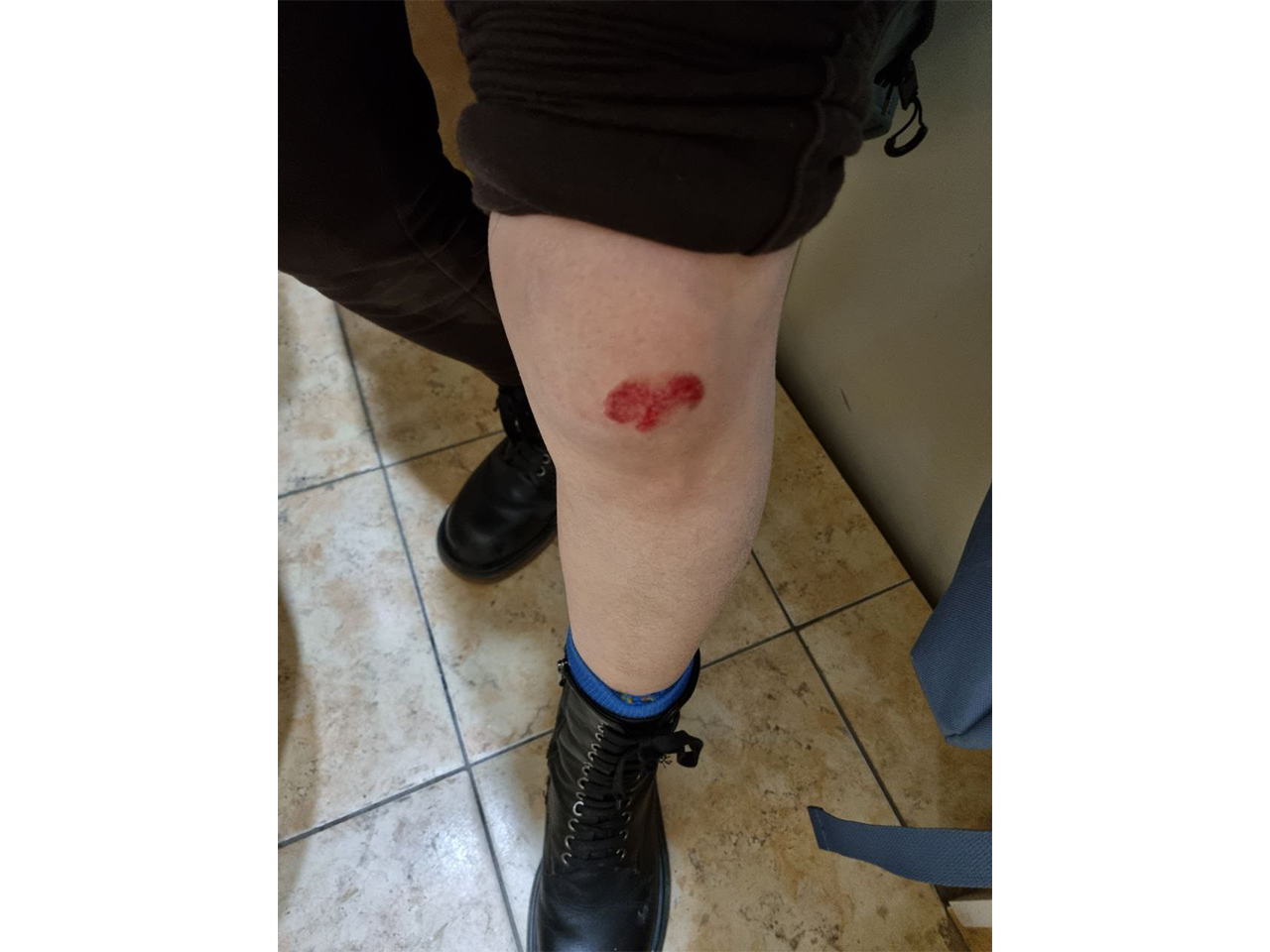
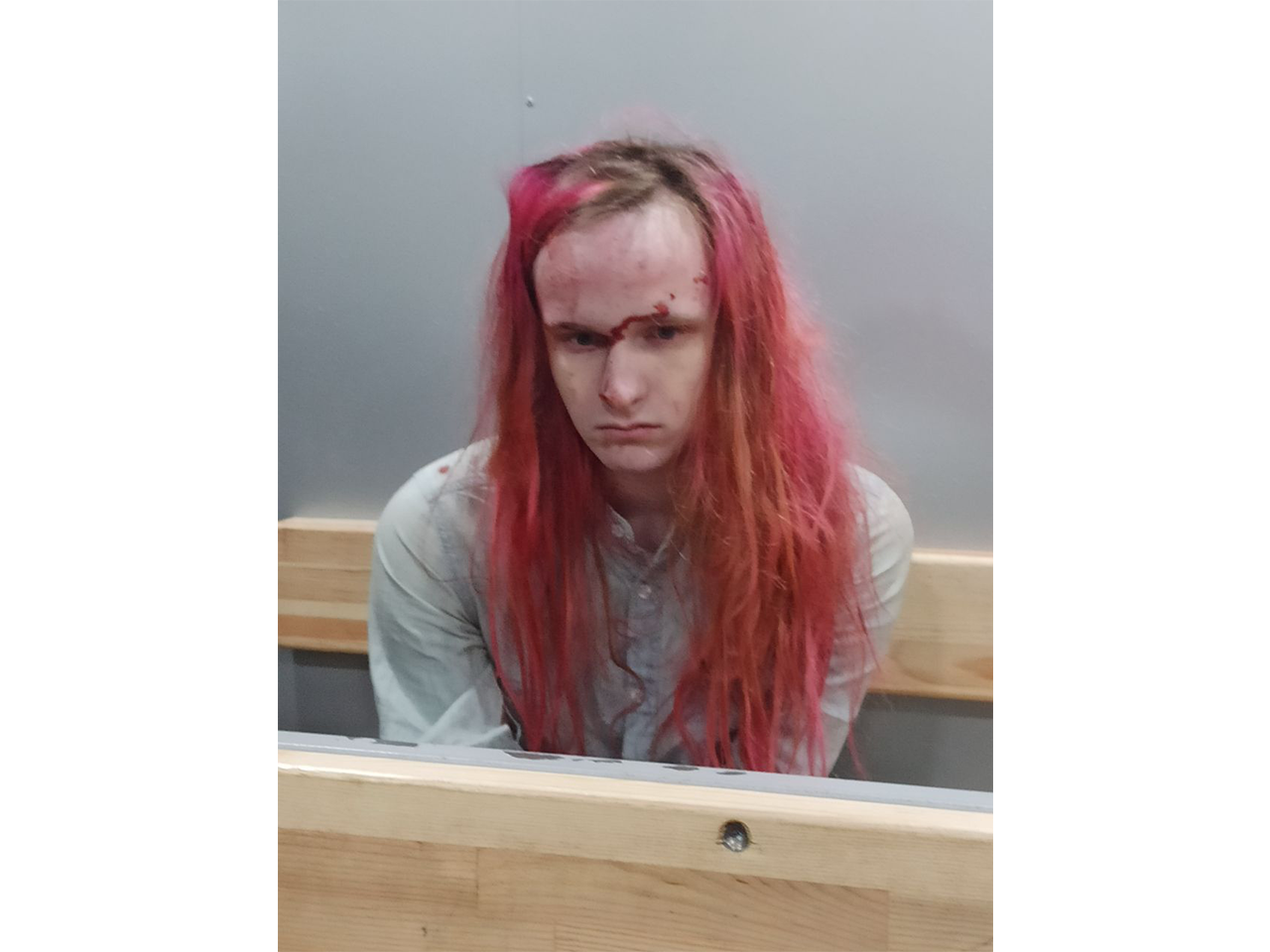
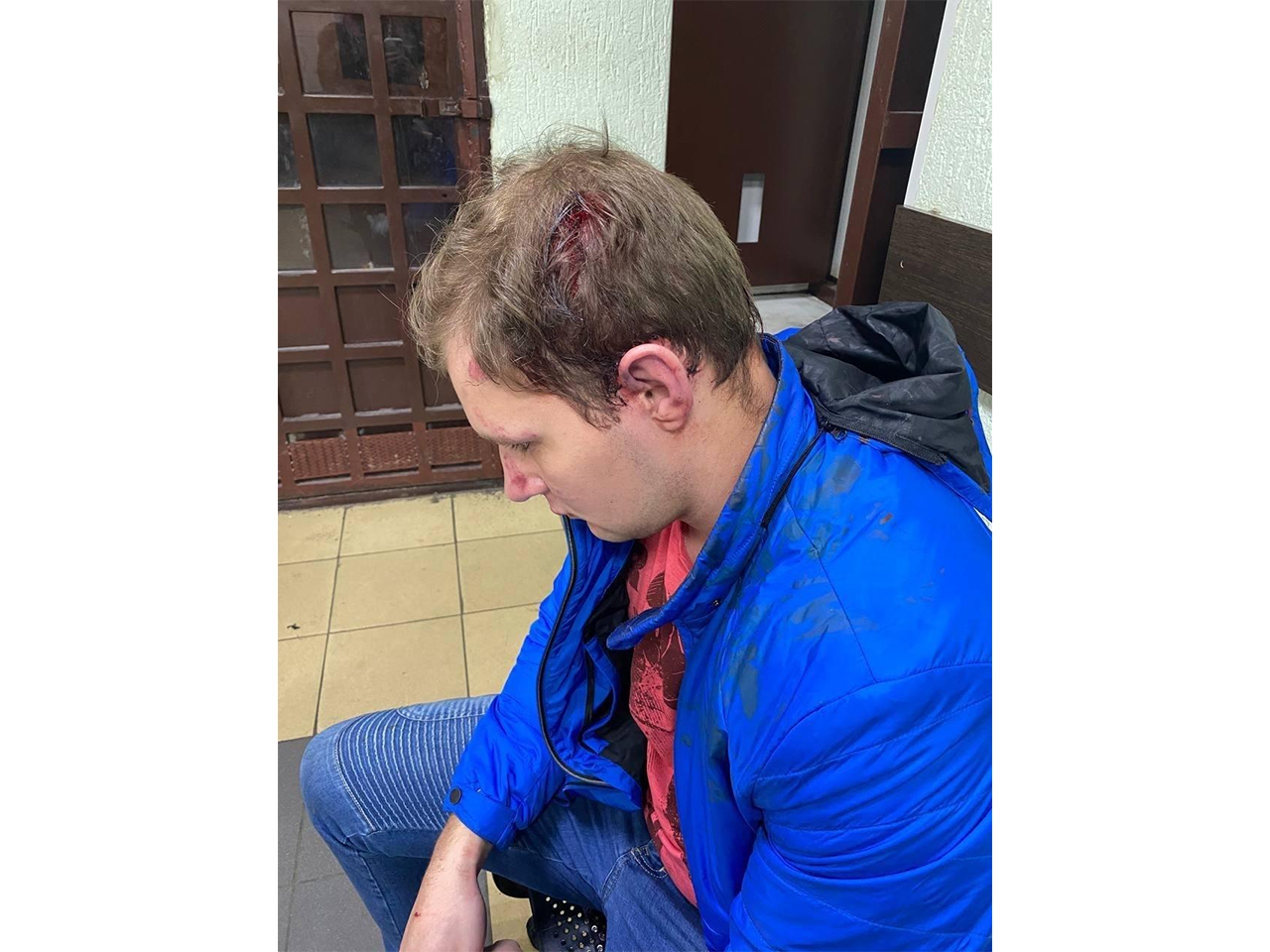
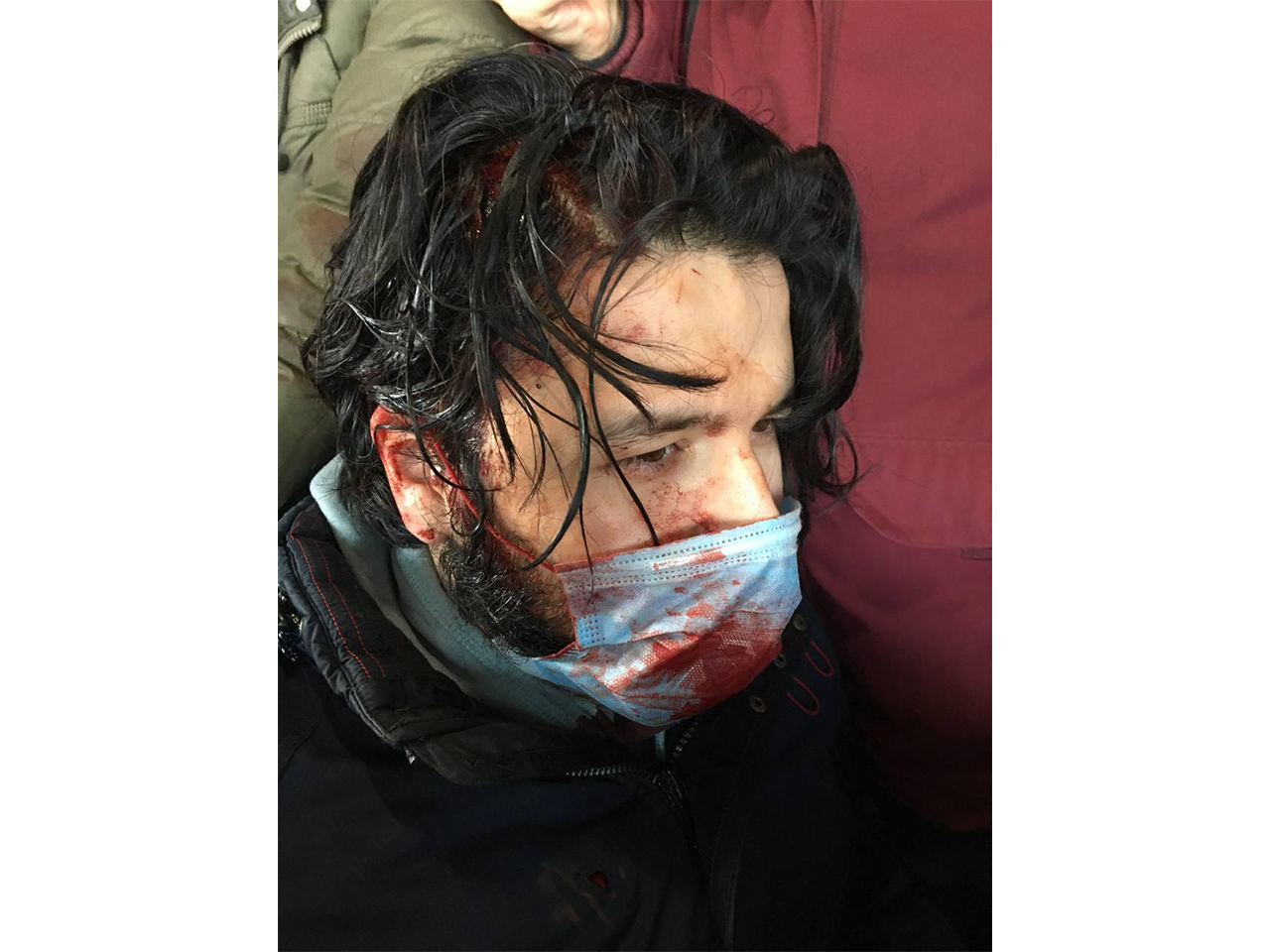
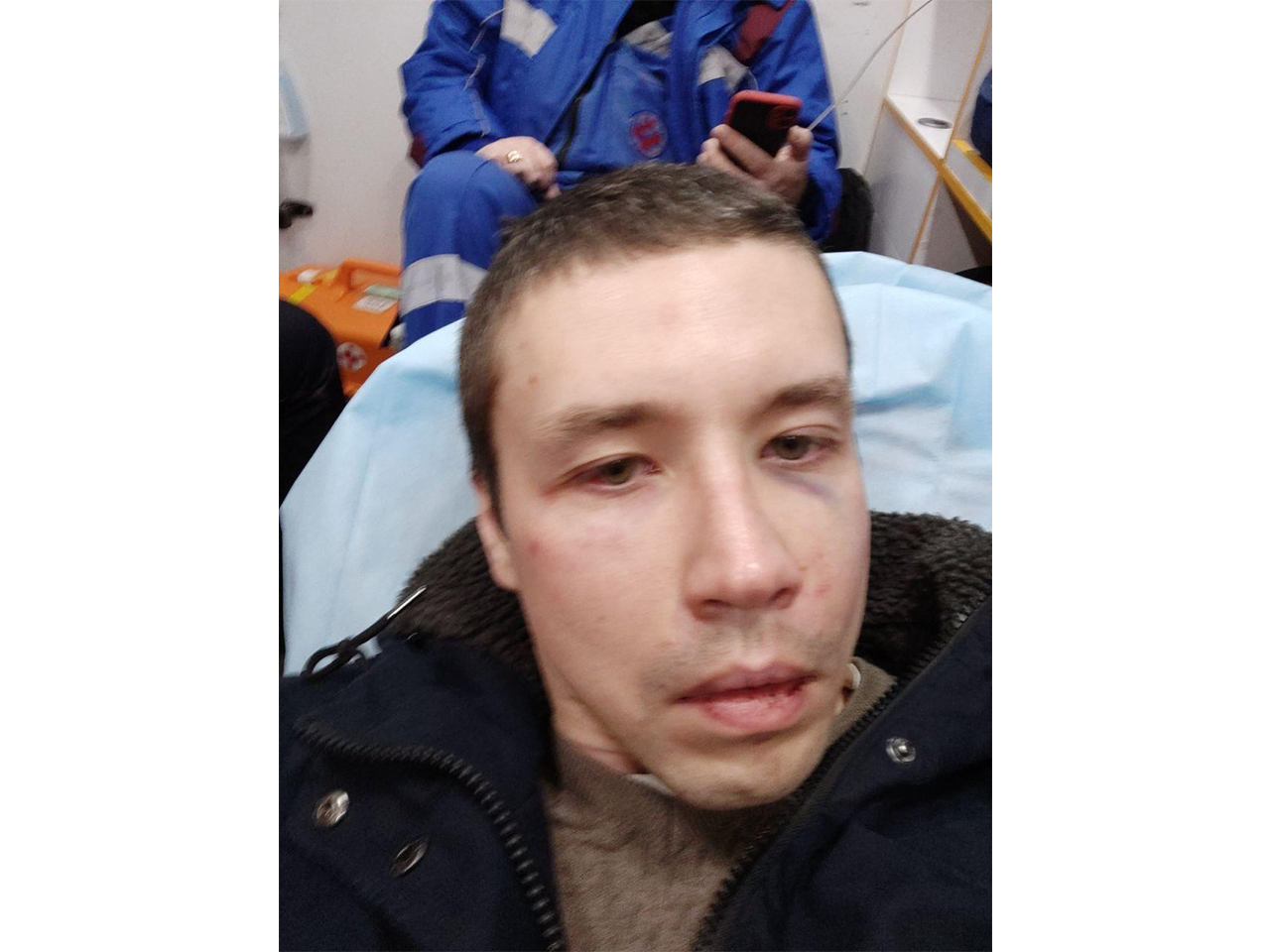
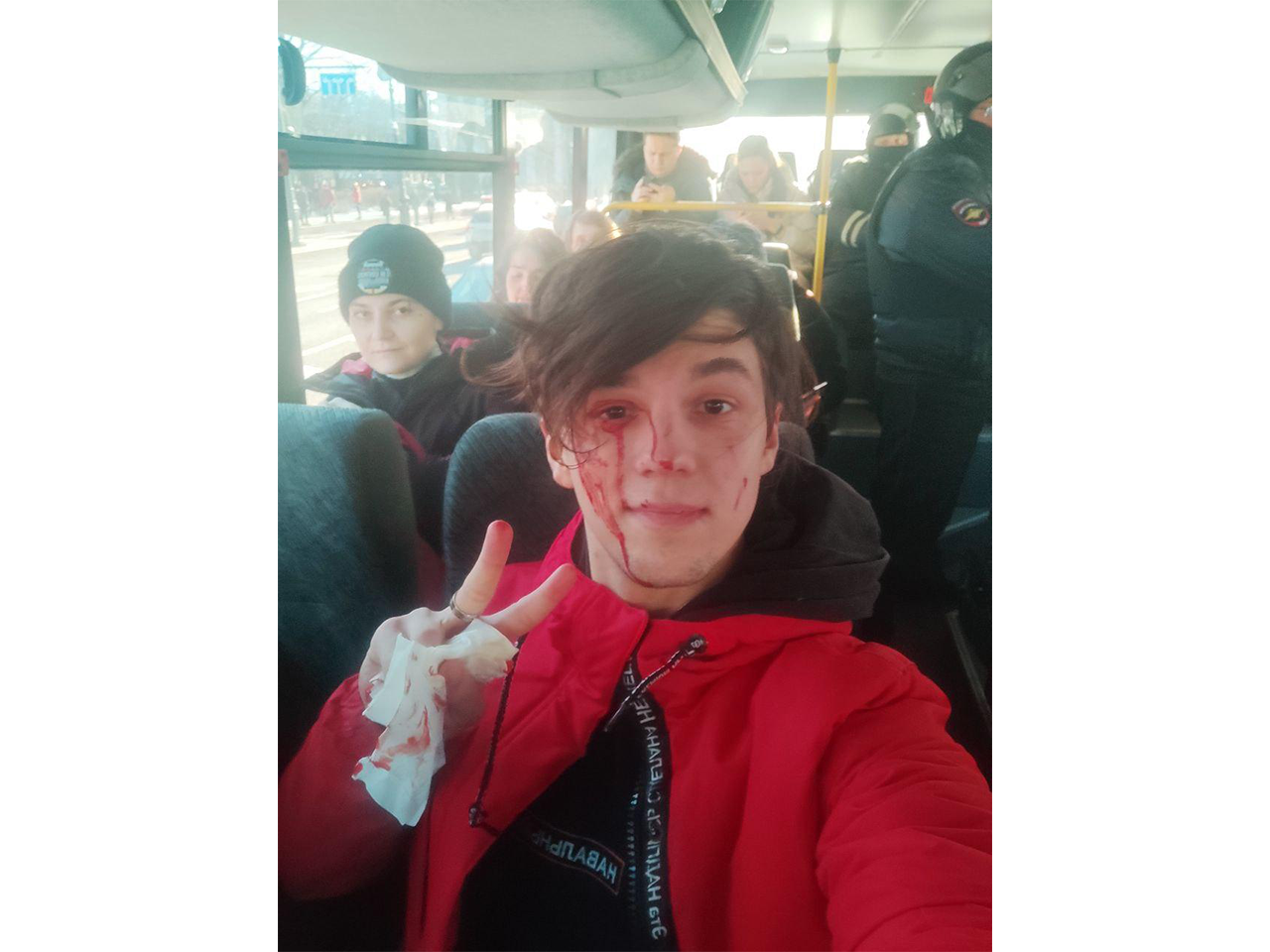
This was followed by a wave of criminal prosecutions: as of April 14, we know about eighty-four defendants in criminal cases, of which twenty-six people from sixteen regions are accused or suspected of «public dissemination of deliberately false information about the use of the armed forces of the Russian Federation» (Article 207.3 of the Criminal Code, introduced in March 2022). The number of criminal cases is constantly growing. All these repressions are taking place in the context of unprecedented suppression of the media, blocking of information resources, declaring journalists and human rights defenders as foreign agents, termination of the work of Russian and foreign NGOs, as well as tightening legislation that increasingly restricts civil rights and freedoms in Russia.
To provide further information on the development of the situation with the suppression of anti-war protests and civil society in Russia, we have prepared an update to our report. Over the past four weeks since the publication of the first version of the report, we have become aware of about fifty new criminal cases for participating in protests or making anti-war statements. At the end of March, the first sentence was passed: a woman was sentenced to two years in a penal colony on charges of causing physical harm to police officers in Moscow. People are also accused of hooliganism, vandalism, involvement in mass riots, calls to conduct extremist or terrorist activities, dissemination of false information, slander, fraud, and other crimes.
A wave of administrative cases against protesters is gaining momentum. From February 24 to April 12, the courts ordered at least 960 arrests in connection with the protests in Russia. Along with the «rally» article 20.2 of the CAO, Article 20.3.3 of the CAO, which was adopted in March and imposes liability for the «discrediting» of the Russian military, is used to suppress anti-war rallies. According to the police and courts, posters, badges with the words «For peace», «No war», blank sheets of paper, flags of Ukraine, etc. discredit the Russian military. Currently, we are aware of at least 9 93 cases initiated under article 20.3.3 of the CAO. It is common for detainees at protest rallies to be charged with two articles at the same time: 20.2 for participating in an uncoordinated public event and 20.3.3. for «discrediting» the Russian military. In addition, at least two administrative cases have appeared since then on charges of calling for sanctions against Russia (Article 20.3.4 of the CAO).
The law enforcement practice of «foreign agents» legislation does not stop and continues to worsen. In early April, the Ministry of Justice for the first time added to the list of individuals labelled as «foreign agents», adding two journalists who allegedly receive funding from Ukraine. Previously, individuals were recognized as the media labelled as «foreign agents», and a special list was empty for a year and a half. Also, the replenishment of other lists of «foreign agents» with individuals, mass media and NGOs does not stop. Back in early March, the Russian parliament adopted a law on a single list of individuals recognized as «foreign agents», which may include a wide range of people who have ever and in any way been «associated» with the activities of NGOs and the media, recognized as «foreign agents».
In early April, a court decision on the liquidation of the Memorial Human Rights Center came into force. The previously liquidated International Memorial, in violation of the law on NGOs, was excluded by the Ministry of Justice from the Unified State Register of Legal Entities and, as a result, the organization cannot use its accounts and property to fulfil its obligations. Also, on April 8, the Ministry of Justice closed the representative offices of Amnesty International, Human Rights Watch, the Carnegie Endowment and twelve other foreign and international organizations in Russia.
Mass campaigns of intimidation of human rights defenders and journalists have become widespread, including using the symbols of the Russian «special operation» in the form of the letters Z and V: unknown people put these symbols on the doors of houses, plant pig heads near the doors, pour paint on people, etc. Under military conditions, the rhetoric of police officers and judges has also acquired a militaristic character: protesters and those who defend their rights or publish materials about them are called traitors. The authorities call for denunciations and encourage them against people expressing anti-war sentiments.
Since the beginning of the war, we have recorded about one hundred and fifty cases of non-admission of lawyers coming to help detainees in police departments. The pressure on lawyers and legal practitioners trying to help those persecuted for anti-war statements and protests continues. After the beating of a lawyer by police officers at the St. Petersburg police station on the night of March 7, it became known about several cases of detentions of other lawyers and searches in their apartments.
According to the human rights project «Roskomsvoboda», the Russian authorities have blocked about one and a half thousand sites since the beginning of the war. Many publishers are forced to stop their work in Russia and are inaccessible to readers without using a VPN and other means of circumventing locks. Since February 24, we have become aware of the detention of at least ninety-four journalists. Media blockages and pressure on journalists are taking place amid ongoing propaganda in schools and universities, in statements made by public officials, as well as in state and state-related media.
The suppression of anti-war protests and civil society in Russia is accompanied by the constant adoption of new restrictive laws. Thus, at the end of March, a ban on the dissemination of «knowingly false» information about the activities of Russian state bodies abroad was legally established, and in early April administrative responsibility was introduced for publicly assimilating the role of the USSR and Germany during World War II. The State Duma has introduced draft legislation on additional opportunities to invalidate the registration of any media outlet, deprive journalists of accreditation, ban foreign media from working in Russia; draft legislation on criminal liability for heads of commercial and other organizations for the implementation of sanctions against Russia, as well as on expanding the list of grounds for termination of Russian citizenship are being discussed.
Annexes
Full list of blocked publications
OVD-Info data on detentions at anti-war rallies by city
The data is relevant as of evening of March 13, 2022, the number of detainees on March 13 is underestimated.
Judicial data on cases for participation in anti-war rallies (Article 20.2) received from February 24 to March 14
Data published on the websites of district courts until the morning of March 14
OVD-Info data on violations in police departments February 24 — March 10
Data on violations by police departments was compiled on the basis of information received by OVD-Info from the detainees and their lawyers. In cases where detainees are transferred from one department to another, we cannot always be sure that the violation is linked to the correct department.



